THE RESETTLEMENT MAGAZINE

Taking Care of Business
Finding your next move in the job market
Caring For Your Mental Health
Prioritising your wellbeing and accessing support
Wealth of Knowledge
Your pension and other benefits explained


Finding your next move in the job market
Prioritising your wellbeing and accessing support
Your pension and other benefits explained



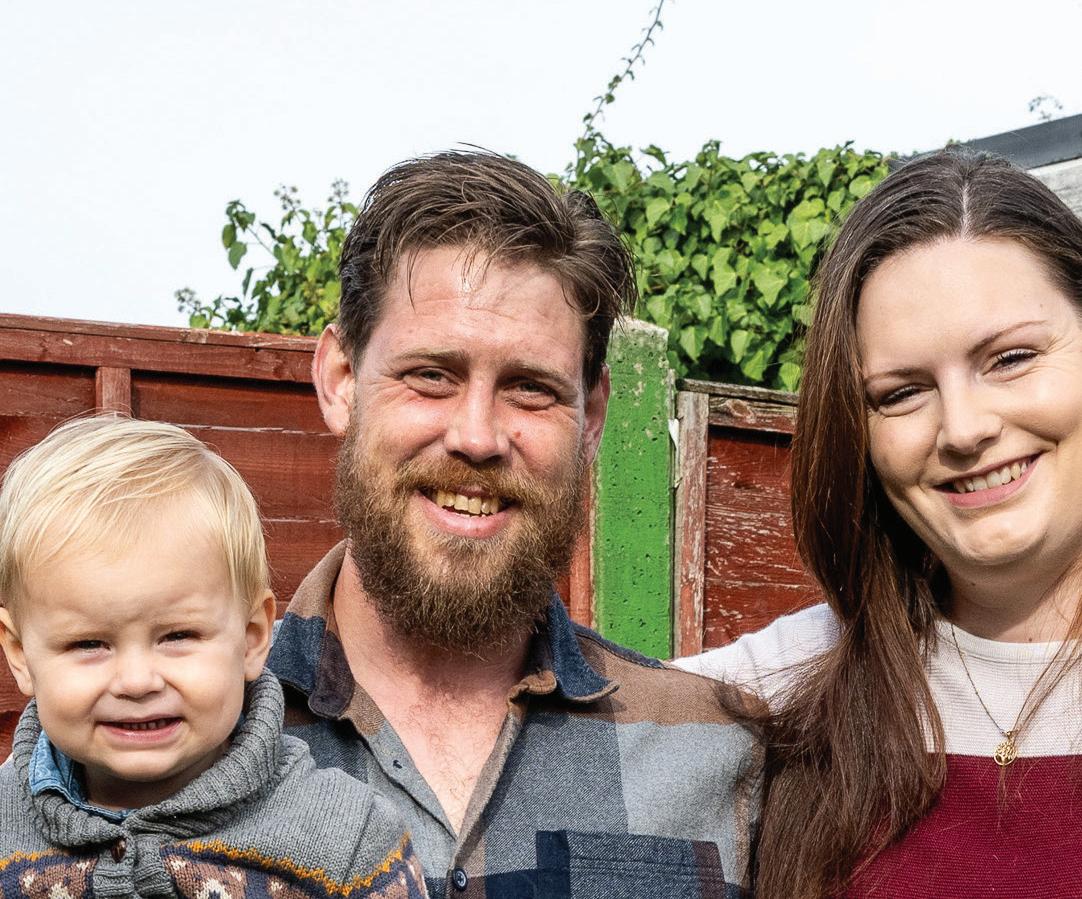






PUBLISHER
Denise Connelly denise@dcpublishing.co.uk
STAFF WRITER
Kate Stevenson
DESIGN AND PRODUCTION
Lucy Baillie lucy.baillie@dcpublishing.co.uk
SALES
Marian Mathieson marian.mathieson@dcpublishing.co.uk
EDITORIAL CONTRIBUTORS
Patricia-Ann Young
ADVANCE MAGAZINE www.advancemagazine.co.uk
DC Publishing Ltd,
198 Bath Street, Glasgow, G2 4HG Tel: 0844 249 9007
If you’d like a free copy of Advance delivered to your door, head to our website. advancemagazine.co.uk/subscribe

eturning to civilian life a er leaving the forces can feel challenging, but with the right support it doesn’t have to be. Planning ahead will make the process smoother for you and your family.
In this issue of Advance, you will find practical advice, information, and resources to help you, whether you’re just beginning or already navigating the
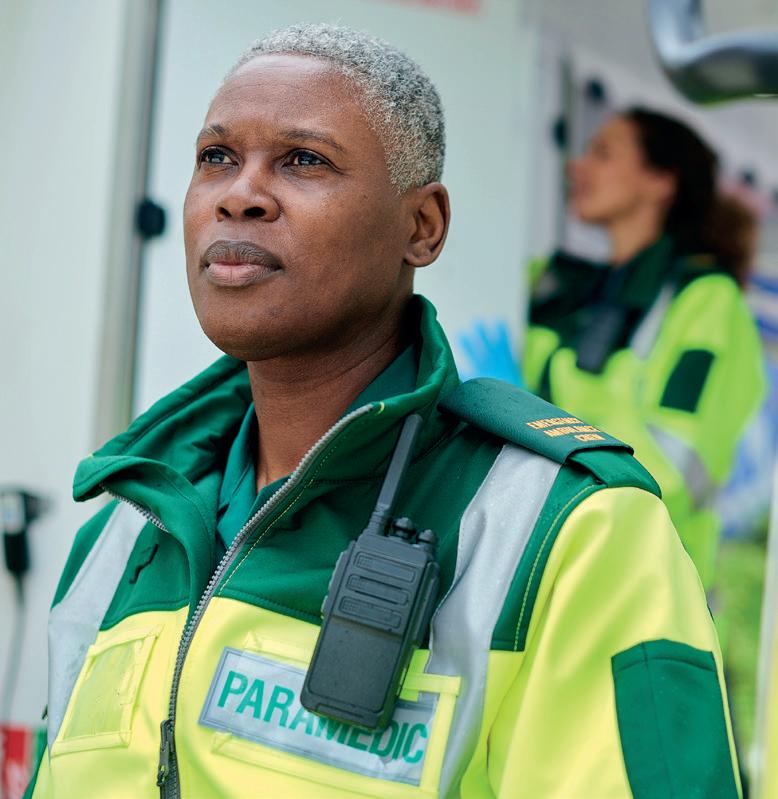
STEPPING INTO SUCCESS
Discover courses designed to help you in civilian life.

The Enhanced Learning Credits scheme could fund your further education.
TAKING CARE OF BUSINESS
Returning
Make
Explore
resettlement process. Discover more about how to use your military skills in a new career, explore the various support options available to you, and get inspired by ex-service member and awardwinning entrepreneur, Callum Coombes, who shares his journey to starting his own business. All this and more inside.

6 MAKING THE MOST OF THE CTP
Find out what dedicated support you are entitled to help you retrain. 24 CARING FOR YOUR MENTAL HEALTH
Discover how to prioritise your mental wellbeing and access support. 27 LIFE WITHOUT BARRIERS
Adapting to a new disability on civvy street.
Learn more about the financial support available to ex-service personnel.
Callum Coombes talks to Advance about his journey from the military to becoming an award-winning entrepreneur. 30 ROAD TO RECOVERY
Neil Sait is set to race across the country to spread awareness about PTSD.

Whether you’re interested in construction, IT, mechanics or starting your own business, these courses offer the chance to build the skills and confidence for civilian life
www.missionmotorsport.org
Mission Motorsport offers veterans opportunities to transition into civilian careers through the automotive and mechanics industries. Their training programmes include courses in vehicle mechanics, project management, and business administration. Designed with flexibility in mind, these courses allow you to study part-time or fulltime, depending on your personal situation. In addition to technical skills, Mission Motorsport provides one-on-one mentoring and career advice to help you secure a job that suits your skills and interests.
www.buildingheroes.org.uk
Interested in a career in construction? The industry is currently facing a skills shortage, making it a prime opportunity for service leavers. Building Heroes offers a Foundation Property Maintenance Programme, a five-week intensive course that covers everything from health and safety to brickwork and basic
engineering. This course not only provides essential skills but also supports you in transitioning into the construction sector, with expert guidance throughout your journey.
www.techvets.co
Your military experience has given you a solid foundation in security— why not apply these skills in the digital realm? TechVets offers free online cybersecurity training tailored specifically for veterans, allowing you to study at your own pace from home. With a training partnership with Immersive Labs, you’ll gain the technical know-how and hands-on experience needed to succeed in the ever-growing field of cybersecurity. With more industries going digital, this is a career path with a strong future.
www.heropreneurs.co.uk
If you’ve ever thought about starting your own business, Heropreneurs might be just what you need. This charity supports veterans, military spouses, and reservists in launching their own businesses through free mentoring, networking opportunities, and access to various business
resources. Heropreneurs connects you with experienced business professionals who provide one-onone guidance and help you navigate the challenges of entrepreneurship. The organisation also hosts the Heropreneurs Awards, celebrating the entrepreneurial achievements of veterans.
www.x-forces.com
X-Forces Enterprise is a leading organisation that supports veterans to start their own businesses. They offer business planning workshops, funding advice, and ongoing mentorship. With a community of like-minded entrepreneurs, X-Forces helps you navigate the challenges of starting a business while utilising your unique skills and experiences from military service. Their support network provides you with the tools needed for success.
Visit the Veterans’ Gateway (www.veteransgateway.org.uk) to learn more about the different training programmes available to veterans.

When
leaving the Armed Forces, the Career Transition Programme (CTP) will be your most reliable resource. But what exactly is the CTP, and what benefits does it offer?
aking the transition from the Armed Forces to civvy street can be daunting, regardless of why you are leaving the forces. Support and guidance will be key to making this move successful and easier to navigate.
The Career Transition Partnership (CTP) is the official Armed Forces resettlement provider for the government, and they’ll play a pivotal role in helping you transition from the military back to civilian life. The CTP will guide you through the move and answer any questions you may have during the process. Anyone can get support from the CTP regardless of their length of service.
The CTP is a partnering agreement between the Ministry of Defence (MoD) and Right Management, who are a global career development specialist. Their main aim is to help service leavers into new employment.
The CTP offers a range of support to all ranks of the UK Armed Forces. Although it varies depending on your length of service, the assistance you receive will be provided free of charge. This essential support is flexible and can start as early as two years before discharge, giving you all the tools you need to market yourself to employers once you leave the Armed Forces. The CTP will be your go to, a er any help or information you have been given from the Army, RAF or Royal Navy.
You can visit the organisation’s website to find out what support you are eligible for by inputting
your length of service into their system. The CTP has nine Resettlement Centres throughout the UK, providing one-to-one and long-term guidance from career consultants as well as trainings and client services administrators.
The main way the CTP helps service personnel and veterans is through employment support. From creating a CV right through to interview skills and applying for jobs, they are there every step of the way. This support doesn’t end once you’ve secured your first job on civvy street, you can access it throughout the rest of your working life.
Once you have registered using the getting started page online, you’ll be able to see what programmes you are entitled to, but all of these should include access to CTP RightJob. This is the CTP’s online job service which lists thousands of vacancies open to service leavers. These could be from local, national or international employers.
The CTP doesn’t just work with service leavers: they work with employers to show them why service leavers make highly skilled, committed employees who bring a range of transferable skills to any role.
It’s never too soon to start thinking or preparing yourself for a new career. The CTP offers workshops and vocational training courses as well as advice on external training providers. Training booked through the CTP is tailored to service leavers, o en cheaper than with external providers, and is MoD approved.
Before attending a training course, you could attend a Career Transition Workshop where you will get support in identifying your transferable skills; creating an effective CV; enhancing your online profile and building interview techniques.
The MoD is committed to improving resettlement support for early service leavers who has served less than four years in an area of the Armed Forces. In response to this, the CTP has developed CTP Future Horizons which is delivered by the RFEA, the forces employment charity, with the support of the
CTP. Once registered with the programme you can get specialist advice and a member of the CTP team will contact you regularly to see how you’re getting on and if you need further support. You can also look at the Regional Employment Bulletin on their website to find opportunities near you for entry level positions, apprenticeships and traineeships.
CTP Assist is a programme launched specifically to support military personnel who are being medically discharged. You will have to be referred to this programme, but it helps people
who are deemed to have the most significant barriers into employment. Once referred, this support is available for up to two years post-discharge.
In the programme you will work with specialist employment consultants who will support, advise and guide you to achieve your preferred vocational outcome whether that is parttime employment, full-time employment, volunteering, education or retirement.
The main aim of the CTP is to help you transition into your new career, but you can access further support
from the organisation around things like finances, pensions and health. The organisation’s Resettlement Guides are a great blueprint of what you should consider during this time with more than 35 guides to explore. These cover everything from selfemployment and moving towards retirement, to industry sector guides which include information on employment opportunities, skills and training requirements, useful links and more.
Access

















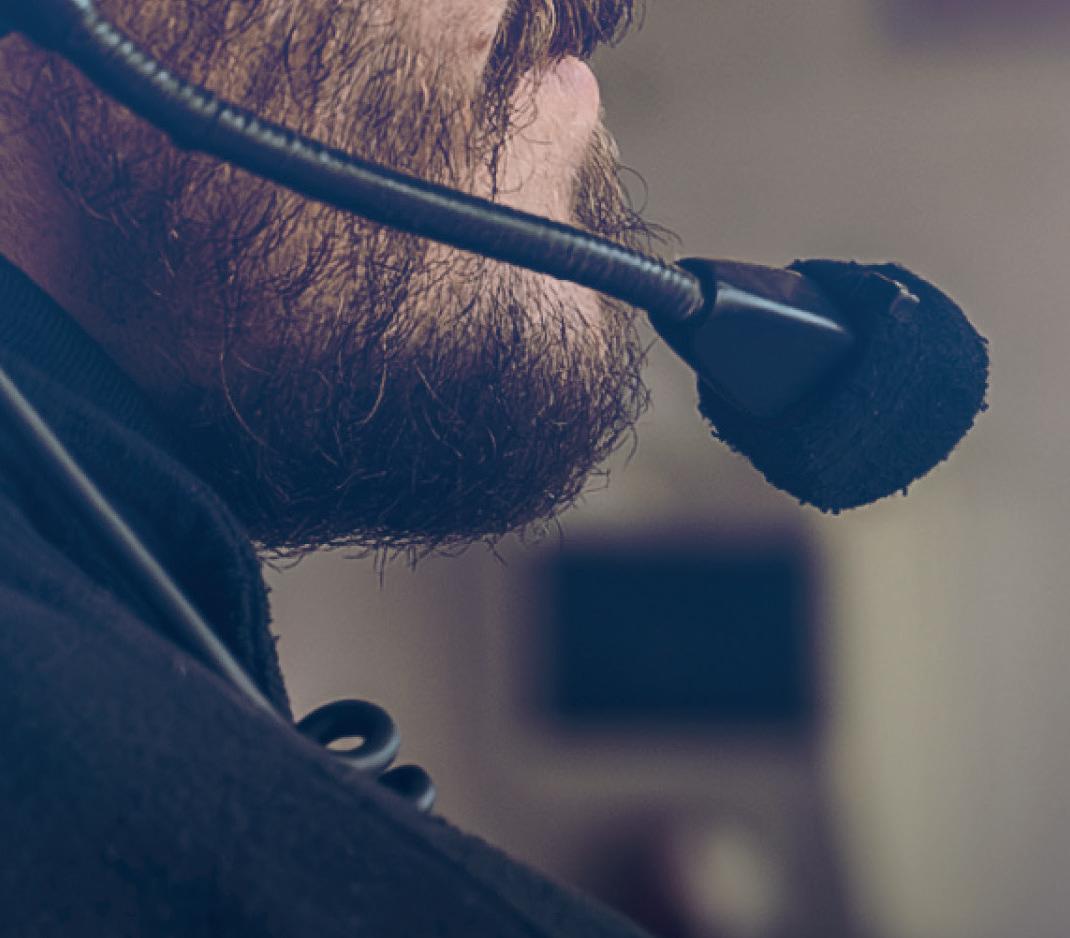





The Enhanced Learning Credits Scheme can help you fund further education whether you are currently serving or are a service leaver. Here’s how it works
The ELC scheme is a government initiative designed to support lifelong learning among members of the Armed Forces, it’s an opportunity to upgrade your current qualifications or retrain as something new. If you qualify for the scheme, the Enhanced Learning Credits Administration Service (ELCAS) will help to fund your higher-level learning. You will receive one single payment (per year, for a maximum of three financial years) towards the cost of your course.
You can use the credits to pay for a nationally recognised qualification at Level 3 (A Level and equivalent). They can also be
used for the National Qualifications Framework (NQF), Qualifications and Credit Framework (QCF), a Level 6 or a Scottish Credit and Qualifications Framework (SCQF).
Applying for the ELC scheme involves several steps, but the process is clearly detailed in the Joint Service Publication (JSP) 822. To be eligible, you must register with the Enhanced Learning Credits Administration Service (ELCAS) and have completed a minimum of four years of service.
If you are currently serving, you can register through your Education Staff. If you have already left the service, you should contact
your Single Service Representative (SSR) to verify your eligibility and ensure your ELCAS account is in order.
The ELC is split into two tiers and depends on your length of service in the military. After four years, you will be entitled to £1,000 worth of funding each year. If you’ve served for more than eight years, you’ll be awarded £2,000 per year.
Remember, you can only make a total of three ELC claims in your lifetime. But you don’t need to use the money for the same course each time. You can only claim once in the financial year, but the scheme will fund several courses or one continued qualification.
As long as you fit the scheme’s criteria, you can claim for ELC support. But you must be able to contribute at least 20% towards the total cost of the course. You have ten years to make a claim. So, take some time to think before you jump into higher education.
To qualify for ELC support, you must meet specific criteria, including the requirement to contribute at least 20% of the total course cost. You have up to ten years from the end of your service to use your credits, so there is no immediate rush. So, take some time to think before you jump into higher education.
Visit the Enhanced Learning Credits Administration Services (ECLAS) at www. enhancedlearningcredits.com to register for the Enhanced Learning Credits (ELC) scheme and make your claim. Once you create an account, you will be able to access their member areas and apply for funding.
One of the most important parts of returning to civvy street is working out what you are going to do next. Patricia-Ann Young finds out what opportunities are available for service leavers in 2024’s job market
When you work in the military, it can be easy to feel out of step with the trends of the outside world.
This can make the decision to return to civvy street all the more overwhelming, especially when it comes to looking for a new job. The trends of the job market can be hard to understand, and while some sectors are performing well, others are struggling with closures and redundancies.
Fortunately, employment rates in the UK are gradually on the rise, and the skills you developed in the Armed Forces are highly sought after in the civilian job market. As you plan your transition to a new career in civilian life, here are a few important points to keep in mind.
We increasingly rely on technology to do our jobs, especially now that more and more people are working from home. The technology sector is booming, and new jobs are being created all the time.
Another advantage of the technology sector is its diversity, offering a wide range of job opportunities. Roles such as data analysts, software developers, IT technicians, and cybersecurity specialists are in high demand. More generally, employers highly value tech-savvy candidates, so having strong technical skills can give you a competitive edge in the job market.

Other areas are changing just as rapidly. The growing climate crisis means there is a need for domestically grown products and ‘green jobs’ are going to come up more and more often. Engineers, production operatives, and quality control inspectors are in high demand.
There are many careers available in the NHS, but it is not just traditional healthcare settings that need workers. Mike Mould was in the military for 17 years but wanted to be closer to home as his children grew up. He became a Health and Environment Advisor for BAE Systems in Barrow, his hometown. He said: “I joined the Army at 17 straight from school. I loved it, it shaped me and made me who I am today.
“I’ve been here for six years now. It’s a really good company that cares about its people and provides all kinds of opportunities for development and growth.
“When I first joined BAE Systems, I had great support from my managers and colleagues. I was new to the industry, and they gave me time, space, and advice to learn my role and help me be successful.”
Many companies value the skill set and work ethic of veterans and actively recruit from this talent pool.
Mike’s employer BAE Systems strongly encourages veterans to apply for their apprenticeship programmes. They offer continuous learning opportunities and in return, hugely benefit from veterans’ vast expertise and

experience in their day-to-day business.
Another company that values its veteran employees is Vodafone. They offer benefits such as workshops for veterans discharged as wounded, injured, or sick (WIS), 10 days Training Allowance with full pay for Reservists, and flexible working for families of serving personnel.
Their head of Business Security Enhanced, Steve Knibbs, is exmilitary. Knibbs oversees the provision of highly confidential cybersecurity and network security services. He served as a telecommunications engineer for the British Army between 1994 and 2004.
The Civil Service is also keen to employ ex-service personnel. The ‘Great Place to Work for Veterans’ scheme is an opt-in recruitment project that allows former members
“Being a veteran is my sense of identity, my status as a veteran will never go away”
of the armed forces who meet the minimum criteria to progress to the next level with their application for most vacancies – whether that’s an interview or an online test.
Stephen Commander is an exserviceman and now works for the Department for Transport. He said: “Being a veteran is my sense of identity, my status as a veteran will never go away.
“I’ve brought the high standards and values I learned in the military to my role in the Department for Transport.”
With so many opportunities out there, it can be difficult to narrow down which ones are the best fit for you. If you need guidance, there are support services in place to help you choose your next career path.
The Career Transition Partnership (www.ctp.org.uk) has been supporting military leavers for over 25 years, helping them resettle into civilian life. Once you sign up you will have access to transition guidance, skills workshops, vocational training, and information about routes to employment.
The Armed Forces Covenant
(www.armedforcescovenant.gov.uk) is committed to removing any disadvantages you may face due to your service history and will support you through your transition back to civilian life.
They provide online tools to translate military qualifications into civilian equivalents and offer Service Leavers’ Adjustment Passports to help employers support veterans with injuries. They also offer advice if you’re struggling to find work after leaving the military.
As you explore your options, remember that your military background has equipped you with valuable transferable qualities that are highly respected in the civilian workforce.
Check out careers at BAE Systems (www.baesystems.com/en/careers) and Vodafone’s Armed Forces Programme (careers.vodafone.com).
For public sector opportunities, visit the Great Place to Work for Veterans scheme (www.gov.uk/government/ organisations/civil-service).
For general employment advice, contact the Forces Recruitment Charity (www.forcesemployment.org.uk).
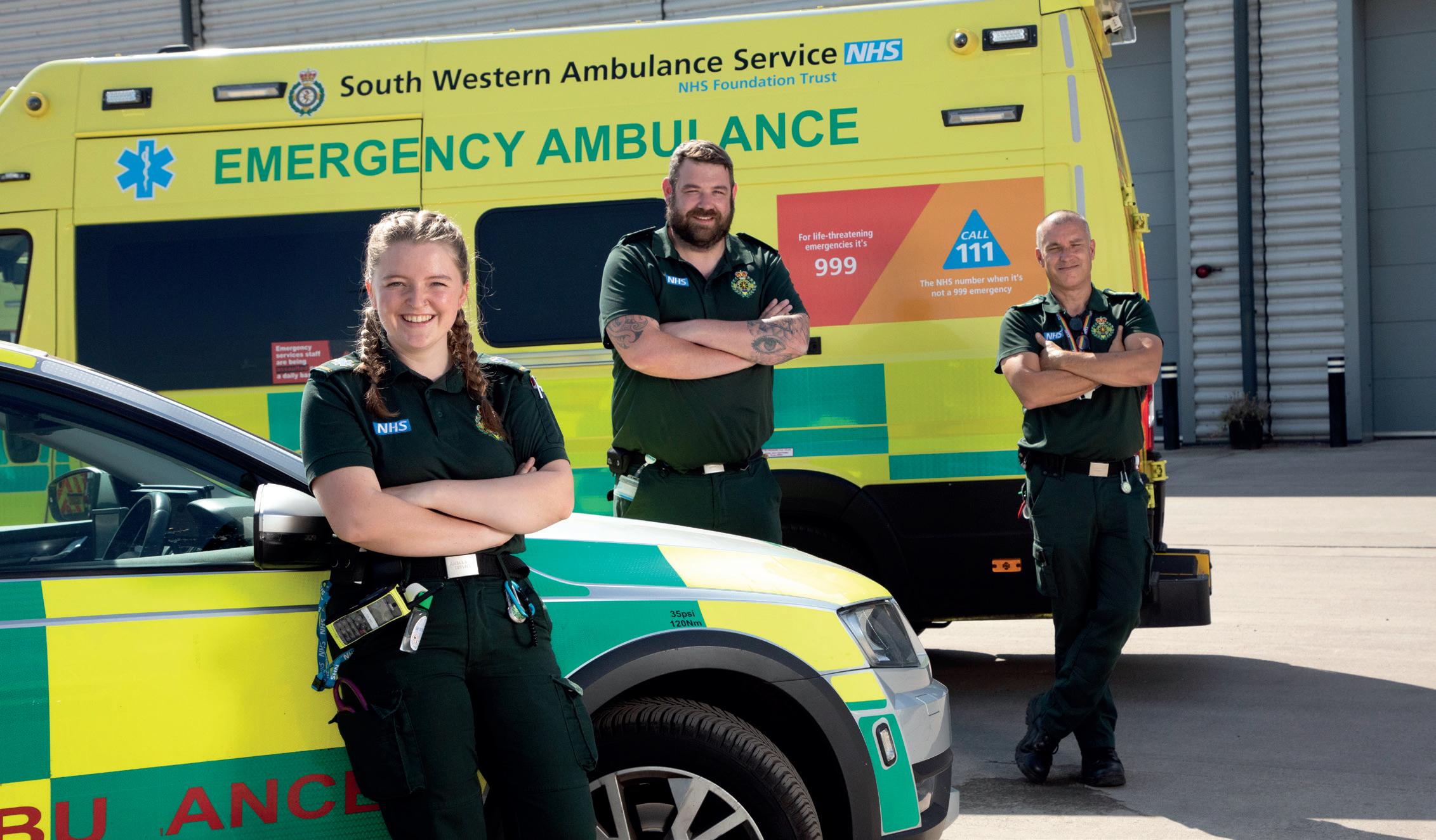
The South Western Ambulance Service NHS Foundation Trust (SWASFT) is seeking compassionate, caring and committed individuals to provide support across a range of both operational and non-operational roles within the ambulance service.
We recognise that Serviceleavers offer great transferable skills and an aptitude for working in a dynamic and diverse environment, making them perfect for a role with SWASFT.
The South Western Ambulance Service NHS Foundation Trust has responsibility for the provision of emergency ambulance 999 services across 10,000 square miles which is 20% of mainland England, covering the counties of Cornwall and the Isles of Scilly, Devon, Dorset, Somerset, Wiltshire, Gloucestershire and the former Avon area (Bristol, Bath, North and North East Somerset and South Gloucestershire).
We are committed to promoting equal opportunities across everything we do, in terms of employment and training, providing services and our engagement and decision making. We welcome diversity and look for self-motivated, enthusiastic people from all backgrounds who care about making a difference, because working for the ambulance service is not just any job. It takes remarkable people to do what our staff and volunteers do day in, day out, to care for those who need us most.
We’re an armed-forces friendly organisation and pride ourselves on the support we offer to veterans and Service leavers.
In December 2021, SWASFT signed the Armed Forces Covenant - a pledge that together we acknowledge and understand that those who serve or who have served in the armed forces, and their families, should be treated
with fairness and respect in the communities, economy and society they serve with their lives.
With Veteran Aware accreditation, we pride ourselves on the support we offer to Veterans and Service-leavers. Veteran Aware accreditation confirms NHS Trusts as exemplars of the provision of the best care for Veterans and their families, to ensure that they are not disadvantaged in the care they receive. This is bolstered by the support offered through our Veteran’s Staff Network and dedicated in-house wellbeing provision, the Staying Well Service, ensuring all of our people have access to the support they need to stay emotionally, physically and socially well.
Want to find out more? Please contact hrservices@swast.nhs.uk


For service leavers and veterans, becoming a paramedic offers an opportunity to continue making a meaningful impact while transitioning to civilian life
cross the UK, paramedics are vital members of the emergency services, bringing life-saving expertise and calm professionalism to critical situations. For former Armed Forces personnel, a career as a paramedic can be a seamless transition, allowing them to continue making a difference in people’s lives while using the valuable skills gained during military service.
To become a paramedic, you’ll need to complete an approved degree in paramedic science or an apprenticeship degree, taking two to four years. However, you might already have a relevant qualification if you worked in a medical role in the Armed Forces. Your military background provides
a strong foundation in first aid, trauma care, and teamwork—key elements for success in this role. Service leavers moving into paramedic roles can get support from organisations like Veterans UK (www.gov.uk/government/ organisations/veterans-uk) and the NHS’s Step into Health programme (www.militarystepintohealth.nhs. uk). Through Step into Health, members of the Armed Forces and service leavers can connect to NHS organisations to set up training opportunities, clinical and general work placements, insight days, and receive application support. The programme provides a dedicated pathway into a career in the NHS, offering guidance and resources to help you meet educational requirements and maximise your military experience.
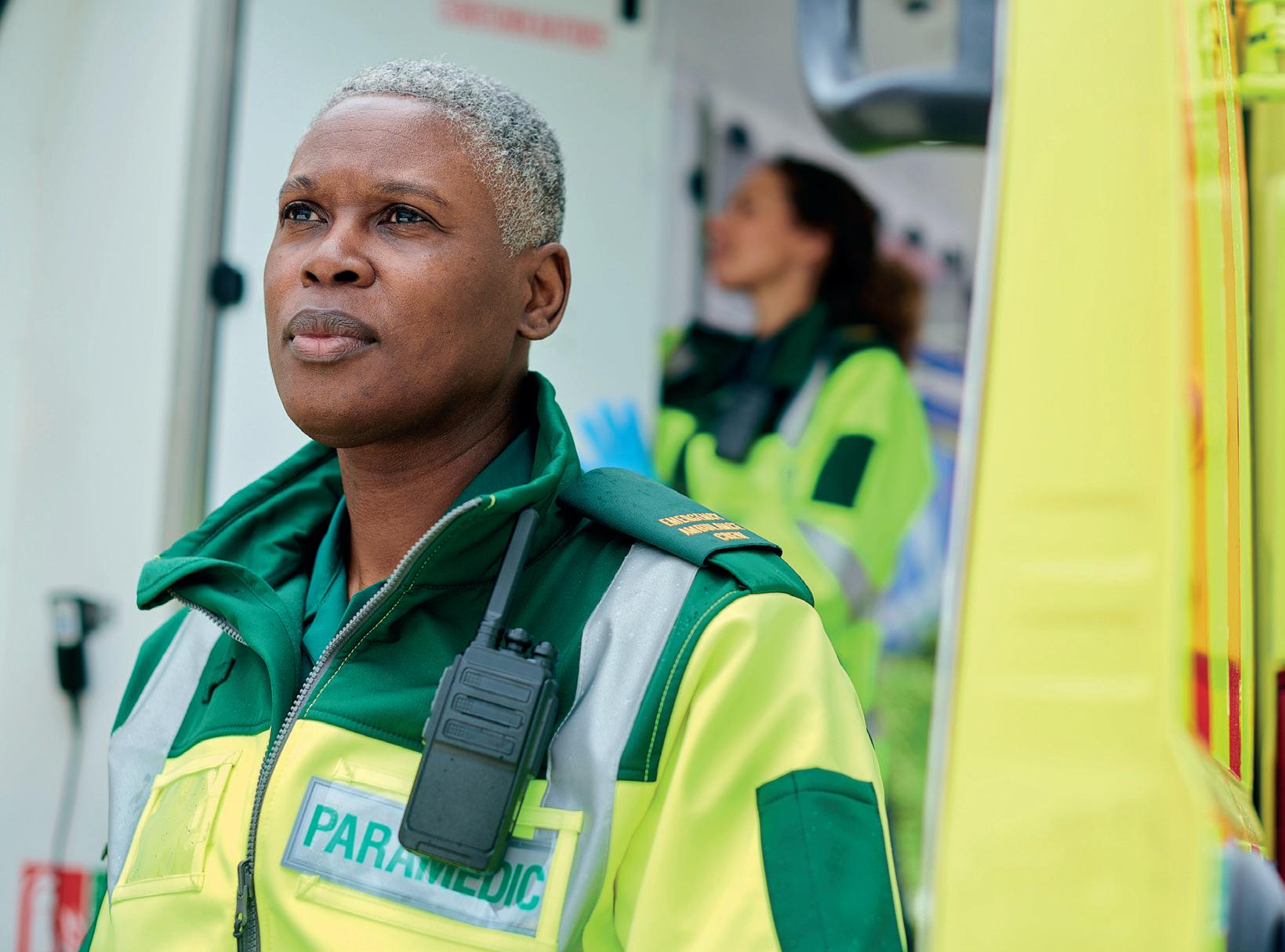
Ambulance services across the UK are always looking for individuals with the right skills, qualifications, and a itude. The discipline, leadership, and mindset you gained in the military will be valuable assets.
Working as a paramedic is diverse and demanding, with each shi presenting new challenges, from responding to road traffic accidents to helping patients who are experiencing serious health issues like heart problems or strokes. You’ll need to quickly assess situations, provide appropriate care, and decide the best course of action, which might include lifesaving interventions like CPR or administering medication. Throughout, you’ll provide reassurance to patients and communicate with other emergency services. Former service members o en find that the discipline, resilience, and quick thinking developed in the military translate well to the highpressure environment. While you’ll face difficult situations, your ability to offer comfort and care in tough situations will be one of the most fulfilling aspects of the job. Many ambulance services also provide flexible working hours and support networks, helping you balance the job’s demands with family life.
As your career progresses, there will be opportunities to advance into roles such as senior paramedic, specialist paramedic, or management positions within the NHS or private sector.
Visit the NHS Careers website (www.healthcareers.nhs.uk) or contact your local ambulance service for information on training programmes, qualifications, and career opportunities.
Your CV is your first opportunity to impress a potential employer. It’s an important tool when transitioning to civilian employment, but where should you start?
Every employer is different but most will ask for a CV along with a cover letter. It’s important that you tailor both of these for each position you apply for. Your cover letter is an excellent opportunity to provide more detail about your skills and experience. Within the letter ensure you include the buzz words featured in the job post you are applying to. Top buzz words include: communication skills, flexibility, and effective.

AVOID
Try not to use military specific acronyms, as civilian recruiters may not understand the reference
Start your CV off by introducing yourself, outlining your career objectives and what you’re looking for in your next role. Don’t shy away from highlighting your time in the Armed Forces – this is a significant part of your career and can set you apart.
The language you use in your CV is very important. Translate military terms into civilian equivalents. For example, if you served as an Officer, this could be described as a managerial or leadership role in a civilian context.
Use your CV to showcase the valuable skills you gained during
your service. Include details about both hard skills (specific qualifications and expertise) and so skills (traits like teamwork, adaptability, and problemsolving) that are relevant to the job.
Employers o en review many CVs in a single day, so it’s important to be clear and concise. Avoid overly complex language and ensure your CV follows a clear timeline of your education, employment history, skills, and interests.
A good CV should be no longer than two pages, which helps keep it focused and easy to read. Include all your relevant qualifications and education history, starting from secondary school onwards. Keeping it straightforward is key. If you have received any medals or commendations, be sure to mention what they were for and why you were awarded them.
When an employer is considering you for a role, they will contact your referees to learn more about your work history, ethic, and to verify your skills. Typically, employers ask for two references: one from a previous colleague or supervisor and another professional who knows you well.
Going from a military career to civilian employment is a significant change, and updating your CV is essential. Pay close attention to language and be sure to triple-check your CV for any spelling or grammatical errors.
Ask a civilian friend or someone working in your chosen sector to check your CV
For additional support you can speak to someone from the Veteran’s Gateway (www.veteransgateway. org.uk) charity or the Forces Employment Charity (wwww.forcesemployment.org. uk). They offer valuable support and resources tailored to veterans entering the civilian workforce.
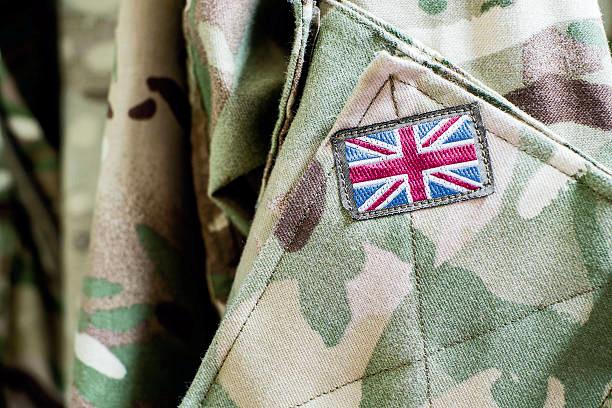


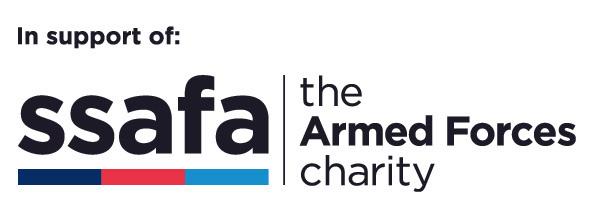


Transitioning from military to civilian life can be challenging, and finding suitable housing is one of your most important steps. Here we explore the housing options available to you as a service leaver, offering practical advice to help make the move as smooth as possible
Leaving the military marks a significant transition in your life, bringing with it a mix of emotions—from excitement about the future to uncertainty about what lies ahead. One of the biggest decisions you will make is where to live once you’ve le the forces. A er years of living in accommodation provided by the military, the housing market might seem unfamiliar and daunting.
YOUR HOUSING NEEDS
The first step in finding your new home is to take stock of your needs. Military life o en involves frequent relocations, making it challenging to establish longterm roots. Now is the time to think about where you want to be, the type of home that suits your lifestyle, and what you can realistically afford. When it comes to location, consider what’s most important
“One of the biggest decisions you will make is where to live once you’ve le the forces”

to you. Do you want to stay close to a military base, or are you ready for a fresh start in a new area? Think about your ties to family and friends, job opportunities, and the kind of environment that will make you feel at home.
The type of housing you choose is another critical decision. If you’re not ready to commit to buying a home, renting can be a
practical and flexible option that allows you to explore different areas before deciding where to settle permanently. Renting involves fewer long-term financial commitments, which can be beneficial if you’re still figuring out your post-military financial situation.
The private rental market offers a variety of housing options, but renting also means dealing with tenancy agreements, deposits, and potential issues like credit checks or the need for a guarantor. It’s important to know your rights and responsibilities as a tenant.
If your income is limited, you might consider social housing. This type of accommodation is usually more affordable than private rentals and is provided by local councils and housing associations. However, long waiting lists are common, so applying early is recommended.
If you’re ready to put down roots and make a long-term investment, buying a home might be the right choice for you. Homeownership offers stability and the opportunity to build equity over time.
Securing a mortgage can be complex, especially if it’s your first time buying a property. Fortunately, some lenders offer special deals for service leavers. Consulting with a mortgage advisor who understands your situation can help you navigate the process and find the best deal.
The UK government’s First Homes Scheme (www.gov.uk/first-homesscheme) is another resource worth exploring if you’re a first-time buyer in England. This initiative offers new-build properties at a 30% discount, making it easier to purchase a home. The scheme is designed to help some first-time buyers, including veterans, by offering homes at a lower cost, making it more accessible to get on the property ladder.
As you explore these housing options, remember you don’t have to go through this journey alone. There are numerous resources and
organisations dedicated to helping service leavers find suitable housing and support during this transition.
One key resource is the Joint Service Housing Advice Office (JSHAO), which is specifically designed to assist service leavers like you. The JSHAO provides guidance on finding accommodation after leaving the military, offering information on both renting and buying homes. They can also advise you on your eligibility for social housing and put you in touch with other relevant services. Find out more at www.gov.uk.
If you’re struggling to secure housing and may be at risk of homelessness after you leave the military, there are organisations that can help. Shelter (www.shelter.org.uk), the Salvation Army (www.salvationarmy.org. uk), and housing associations like Haig Housing (www.haighousing. org.uk), Hightown Housing (www. hightownha.org.uk), and Stoll (www.stoll.org.uk) offer personalised support, working closely with you to find a solution that suits your needs. Cobseo, the Confederation of Service Charities, also provides a thorough directory of housing support charities specifically designed for veterans and service leaders, which you can access on their website (www.cobseo.org.uk).
By understanding your needs, exploring the options available, and seeking support, you can make informed decisions that will help you take the next step forward in your journey. Whether you’re looking to rent or buy, the right guidance and resources can make all the difference in finding a place to call home.
Citizens Advice (www.citizensadvice.org.uk) offer advice on housing, applying for funding and help if you are experiencing homelessness.

It’s normal to feel worried about your finances after leaving the Armed Forces, especially when searching for a new job or home. We explain the Armed Forces Pension Scheme and tell you more about the benefits you’re entitled to
All members of the Armed Forces are automatically enrolled in the Armed Forces Pension Scheme (AFPS). Unlike many other pension schemes, no personal contributions are made towards this.The scheme is funded by the public purse to recognise the dedication made in service to the country.
Your pension benefits can be accessed after leaving the Armed Forces or upon reaching retirement age, without affecting your state pension. To qualify, you must have served for a minimum of two years. These rules apply to both regular and reserve personnel.
If you serve until the age of 60, your pension becomes payable immediately. Otherwise, it will not be payable until you reach the state pension age. An exception exists if you are unable to serve for your full career due to circumstances beyond your control.
If you have completed 20 years of service and are aged 40 or over, you may be eligible to receive an income from the pension scheme.
You can estimate your pension using the Armed Forces Pension Calculator available at www.gov.uk.
For further advice and information about the AFPS, you can contact Forces Pension Society at www.forcespensionsociety.org.
After leaving the Armed Forces, you may be eligible to claim certain benefits if you are struggling to find steady work, looking for somewhere to live, or require additional support due to illness or injury. You can apply for veteran-specific benefits, as well as benefits that are available to the general public.
If you became ill or were injured during service on or after 6 April 2005, you may be entitled to money through the Armed Forces Compensation Scheme (AFCS). The scheme offers both lump sum
“No personal contributions are required for your Armed Forces pension”
payments and, in certain cases, ongoing weekly payments known as a Guaranteed Income Payment (GIP). The amount of money you receive depends on the severity of your injury or illness and your age.
The Armed Forces Independence Payment (AFIP) provides £172.75 per week to cover extra costs from service-related injuries. This benefit is equivalent to the enhanced rate of Personal Independence Payment (PIP) or the highest rate of Disability Living Allowance (DLA), now known as Adult Disability Payment in Scotland. It is exclusive to former Armed Forces personnel and isn’t means-tested, so your financial situation doesn’t affect eligibility.
In addition to Armed Forcesspecific benefits, you may also be eligible to apply for Universal Credit, Jobseeker’s Allowance, or Housing Benefit. For more information on these benefits, visit www.gov.uk or contact Veterans UK at 0808 191 4218.
For further advice and support with your finances, contact MoneyHelper (www.moneyhelper.org.uk).
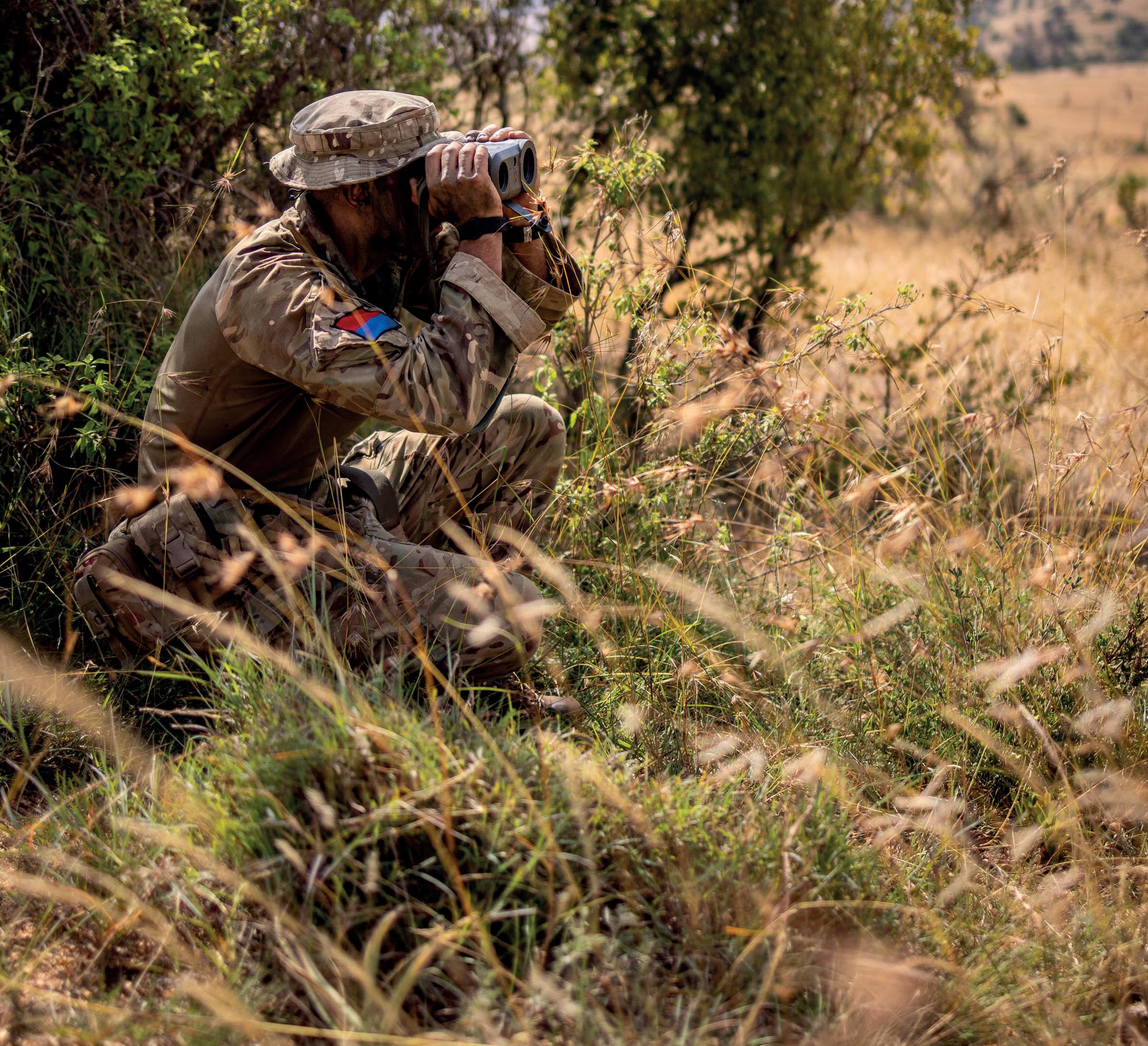
Many of those serving decide to leave before taking all considerations about their pension into account. Worse, many do not appreciate their worth, often underestimating their pension value. At today’s values, a pension income of £20,000pa would require a pension pot of at least £400,000.
Seeking individual guidance from the Forces Pensions Consultants at the Forces Pension Society, will help you secure a firm financial base before advancing into the outside world. Even timing your departure to best advantage can make a significant difference to what you receive.
Here’s what one Society Member wrote to us recently:
“As I approach my final weeks in the Army, the Forces Pension Society has been amazing. Incredibly patient with my questions. A brilliant organisation, providing such important support to Service leavers. Thank you! “
Your pension will be a significant element of your entry into the civilian sector or into retirement. Either way, your, and your family’s, well-being depends on matching your pension choices to your personal circumstances.
Join us and arm yourself with the information you need about your real worth before you decide to leave.
Pension guidance is just one of the many benefits of membership. As an independent, not-for-profit organisation, our membership subscriptions help to fund our support for the Veterans’ Community, our Roadshows and Webinars, our attendance at CTP Employment Fairs, plus our vigilance in taking governments to task whenever we spot unfairness or injustice in the system.
And importantly, we provide the whole military community with a voice that counts, on the representative bodies for Armed Forces and Public Sector Pensions.
Visit: forcespensionsociety.org/join-now/
Annual membership for you and your spouse/partner is just £45. You will have exclusive access to our Forces Pensions Consultants, our informative Members’ Webinars and you’ll receive our bi-annual enewsletters and our magazine, Pennant.
You’ll also have access to our wide range of membership benefits from discounts on new cars to insurances, including our latest range of travel policies.




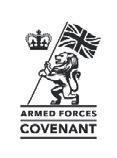


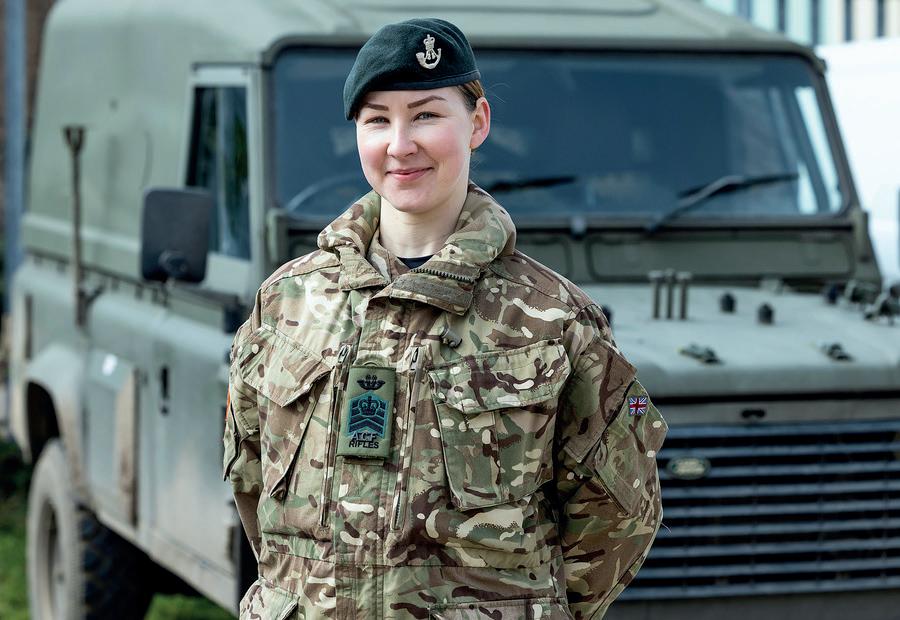
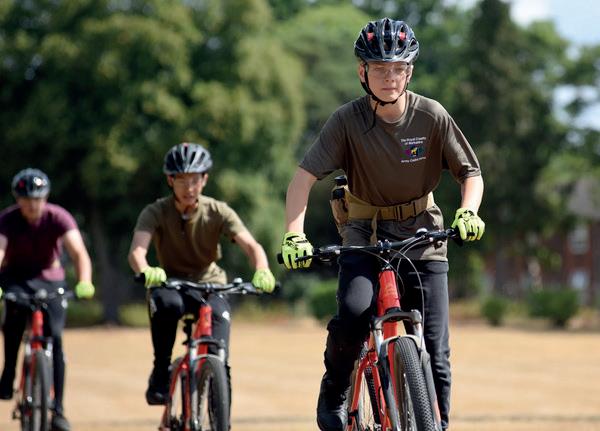
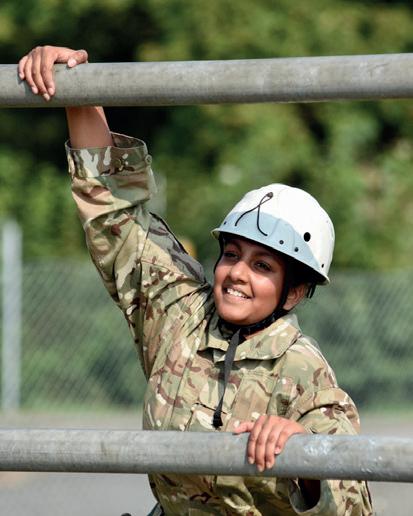


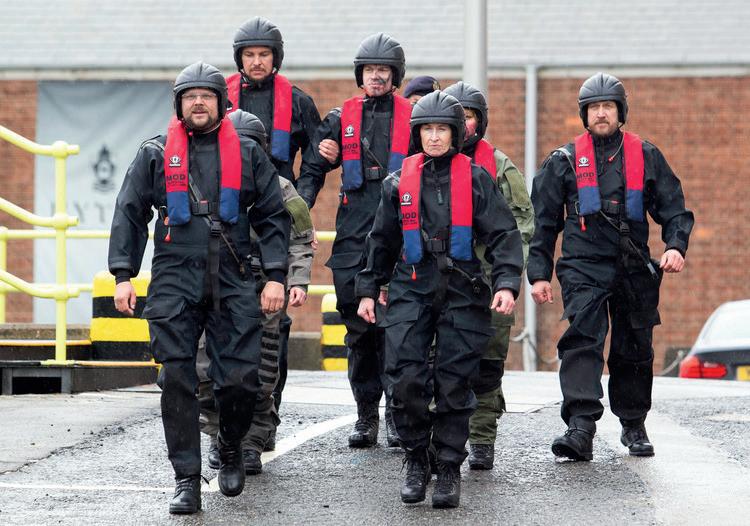
www.royalnavy.mod.uk/rnr
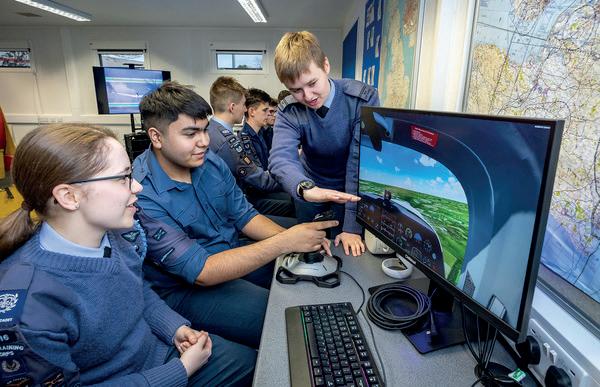
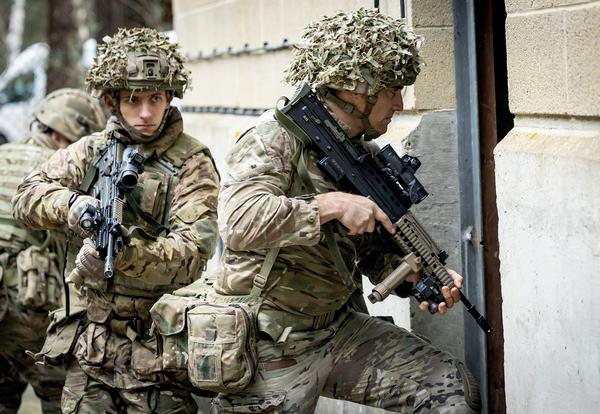





www.royalnavy.mod.uk/royalmarines



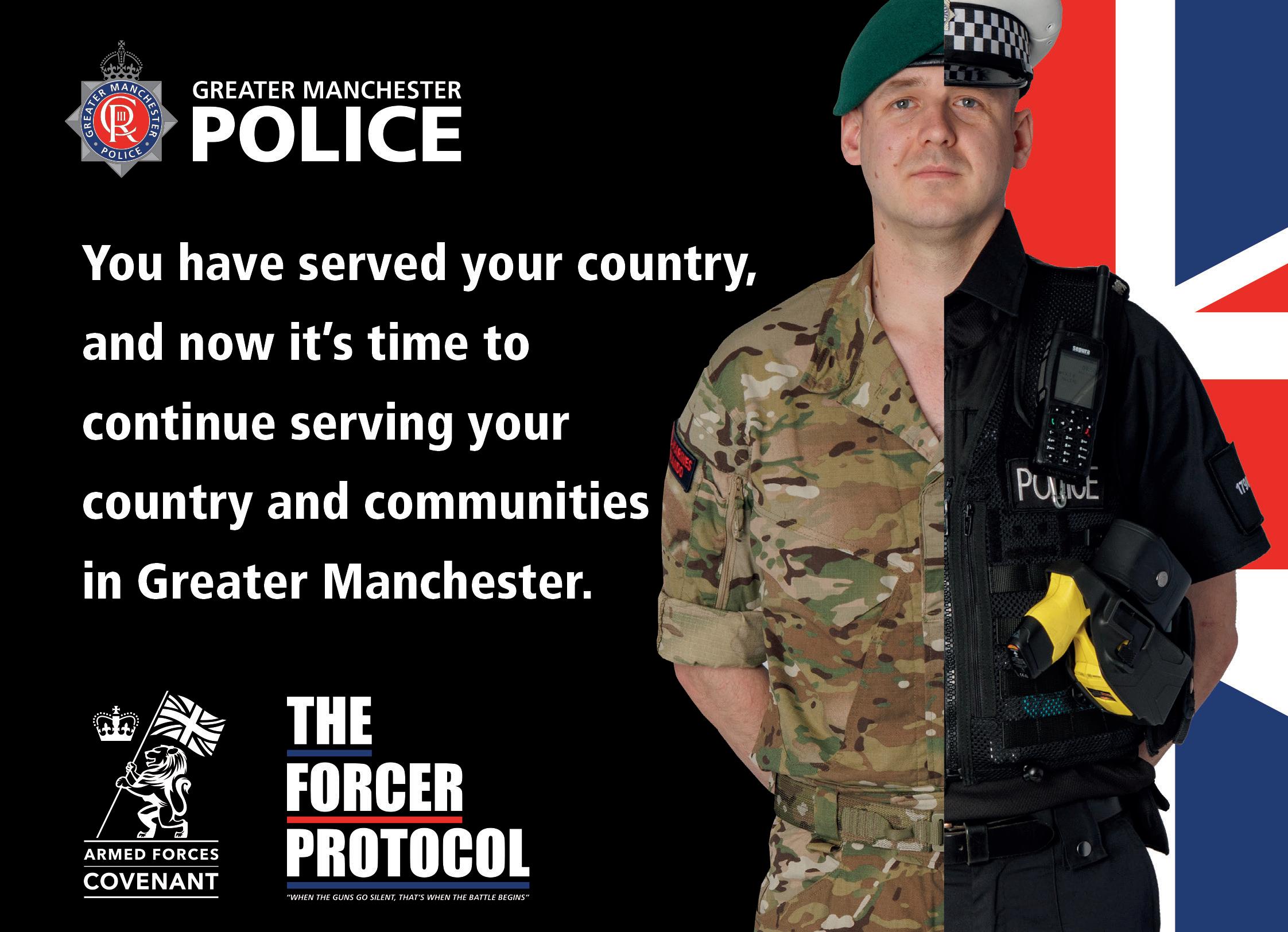
From Wattisham Airfield to the University of East Anglia, former REME Avionics Technician
Callum Coombes talks with Advance about his journey from the military to becoming an awardwinning entrepreneur
Q: Tell us about your career in the Army…
A: I joined the British Army at 17 and qualified as an Avionics Technician, where I was responsible for maintaining and repairing the avionics systems of military helicopters. I travelled the world, from California to Afghanistan, and really made the most of everything the Army had to offer. I qualified on a long list of airframes, and I even got my scuba diving license.
Q: Why did you decide to leave the Army?
A: I’d been serving in the Army for about four years when I decided I wanted to go to university to study computer science. I’d already completed all the qualifications available to me in the Army, but I was still eager to learn more. I spoke to the learning team on campus about my different options and discovered there was a lot more support for funding than I initially thought out there. The Army helped me each step of the way to apply for university and guided me through the process for ELCAS PFHE funding too.
Q: How did your troop react to your decision?
A: I actually did my university interview on the side of an airfield in Israel. Everyone was very supportive of me and knew what I was trying to achieve. I had a lot
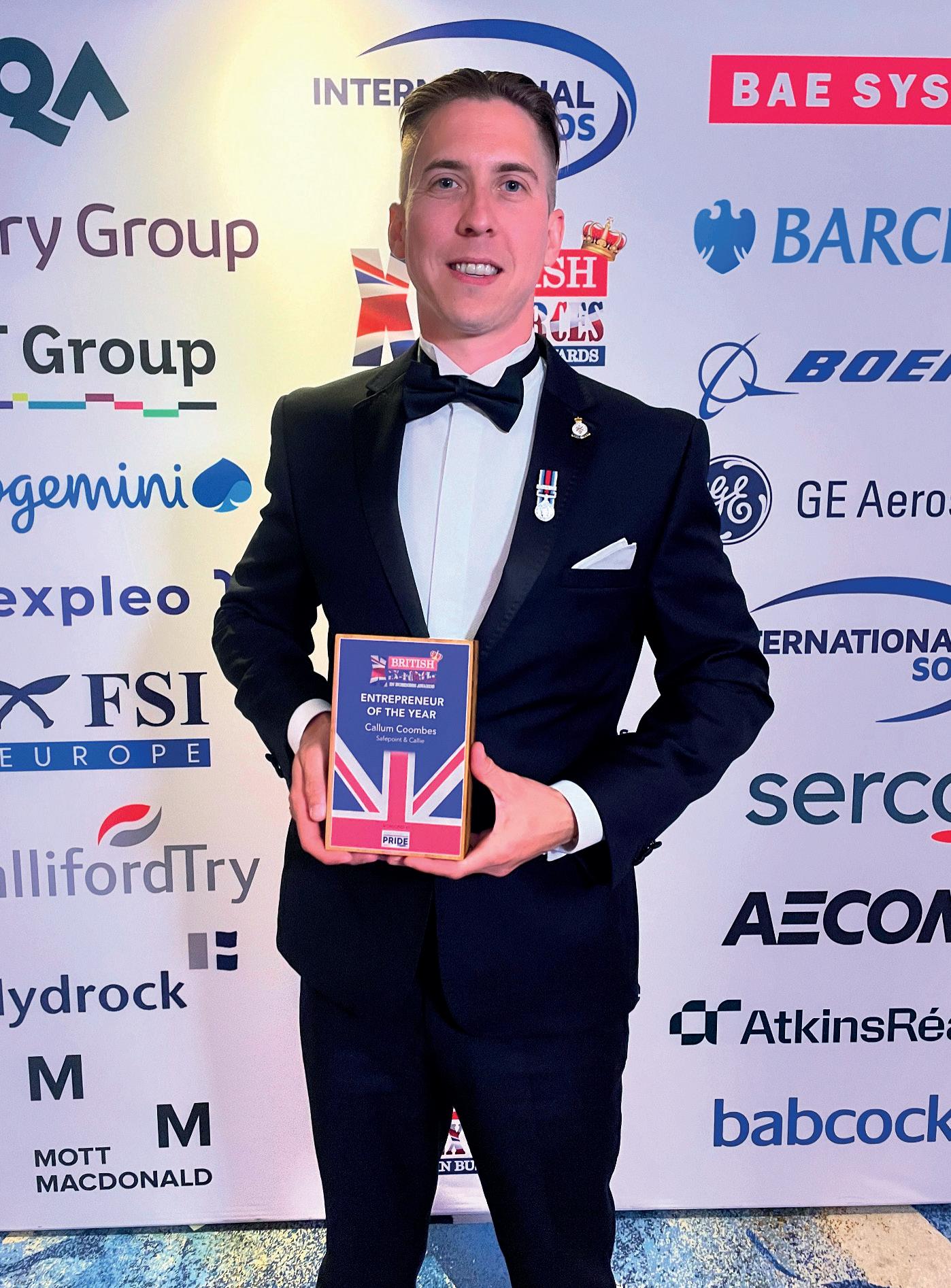
of leeway and support throughout the process because it was difficult. Of course, there were a lot of challenges but I had just as much support throughout my transition.
Q: What obstacles did you have to overcome?
A: I did terrible in my GCSEs for maths at school, so I had to resit them whilst at Wattisham Airfield before I went on tour. I let my chain
“There was a lot more support than I initially thought out there”
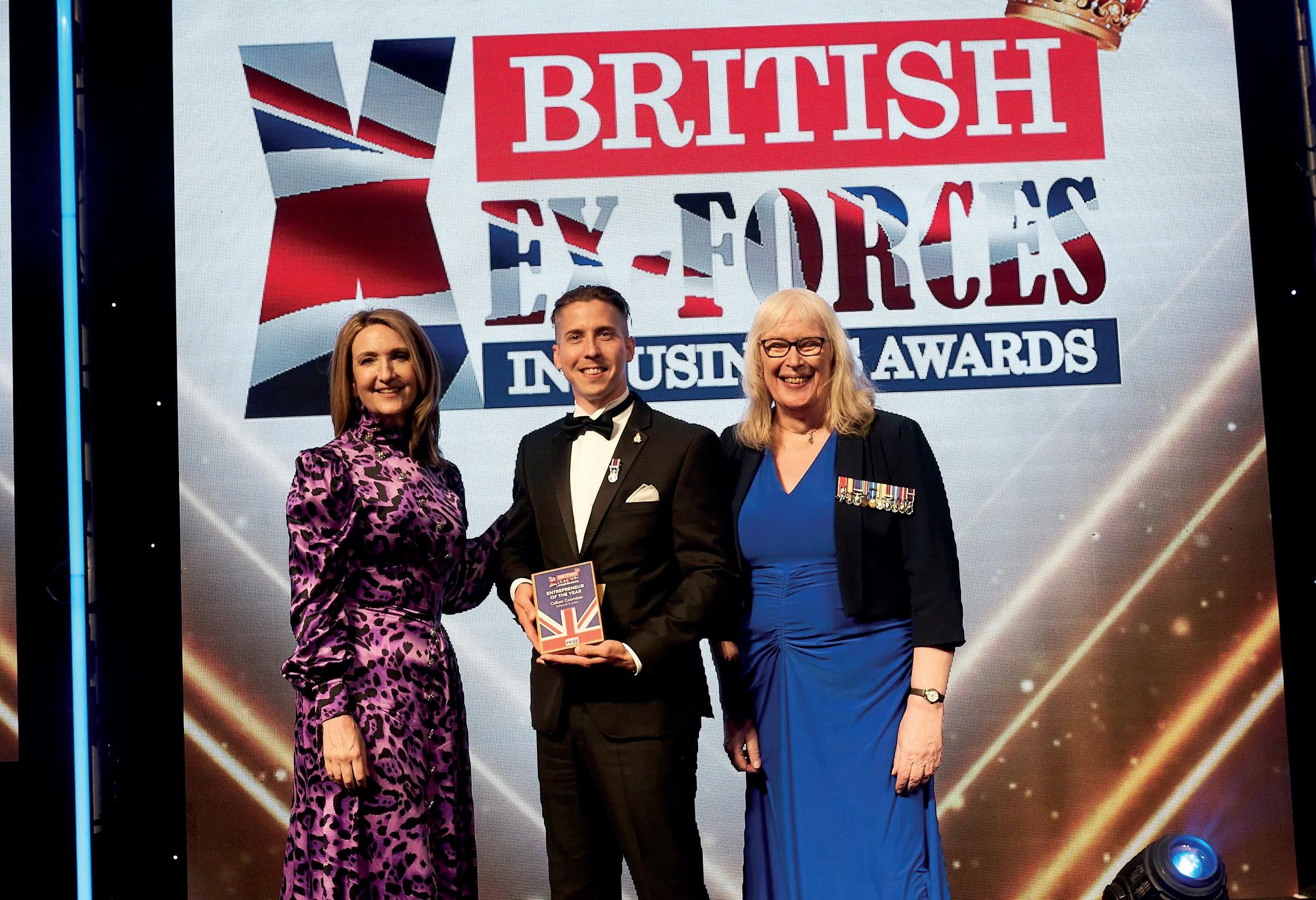
of command know about my goals, and we worked out a plan for moving forward. I’d trained for so long, so I still wanted to go on tour before I went to university, but I don’t think I could have done it without their help. Working a nineto-five while studying for exams was difficult, but I had a strong support network.
Q: What was it like to return to education, after serving in the Army for five years…
A: It was a huge adjustment, especially since I had just come back from Afghanistan, where I had been standing for parades before work every morning. All of a sudden, I was a 23-year-old moving into student accommodation next to 18-year-olds fresh from secondary school. The Army was all I had known since I was seventeen—it was a huge shock to the system.
Q: You are now the CEO of two successful companies Safepoint and Callie…
A: I’m quite a techie guy, as you can imagine. Even before I joined the Army, I was interested in all things tech, so I ended up in engineering. After university, I worked for Lockheed Martin in the defence
“It gave me the liberty to build a path that worked for me”
and technology sector, but working for someone else didn’t allow me the creative freedom I wanted. I was working on my own projects at the weekend, and eventually, I took a leap of faith and launched my own tech product. It was quite a natural progression, and it gave me the liberty to build a path that worked for me.
Q: How have the skills you learnt in the Army helped you throughout your career?
A: As an AVI technician, my whole job was fault-finding and problemsolving. If something didn’t work, I had to identify what was wrong with it and fix it. I used this skill often when I was employed by Lockheed Martin, and I continue to use it in my own projects when I encounter obstacles. Especially as an entrepreneur, having the ability to look at problems in different ways is so important.
The Publicly Funded Further Education/Higher Education (PFHE) scheme allows service leavers to access their first higher education qualification free from tuition fees. Turn to page 9 to find out more about ELCAS and your entitlements.
Q: What military trait helped you the most as an entrepreneur?
A: Determination is probably the biggest one. It’s something that’s fortified into us in the Army, but it’s so important as an entrepreneur. Some days are incredible, but others can be awful. My job has real highs and lows, but it’s so important to just stick with them. It takes a strong military mindset to persevere through it.
Q: Do you have any advice for future service leavers?
A: I was supported right from the beginning of my transition because I reached out and asked for help. There were so many resources, more than I knew existed, and all I had to do to find out about them was ask for help. It’s so important to ask your commanders for help— there’s no shame in it. Even after you leave the Army, there is still so much support out there.
Callie is a free personal safety app that allows you to share live locations with your loved ones, trigger emergency alarms, and much more. Visit www.getcallie.com to download the app or search for it on the app store.




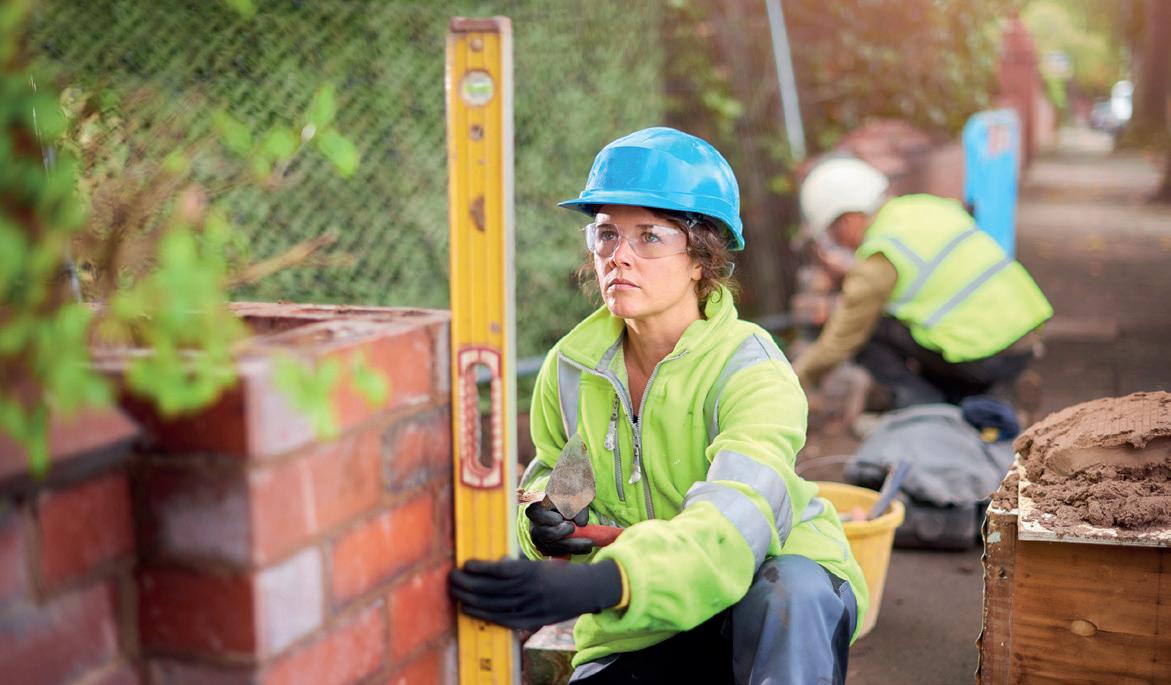
HINKLEY POINT C SUPPORT OPERATIVE BRONZE PROGRAMME:
2 weeks FREE training or 4-week evening delivery with guaranteed interview for employment with HPC supply chain as a General Labourer.
LEVEL 3 BUILDING, INSTALLATION AND PROPERTY MAINTENANCE:
Advanced 4-week Bricklaying, Carpentry, Plastering, Plumbing & Electrical course, no previous knowledge required.
LEVEL 3 AWARD IN ADVANCED WELDING SKILLS:
15-days training in Advanced MIG and MAG welding, no previous knowledge required.
Plus a range of short skills courses in all trades...
Property Maintenance
Advanced Welding
& L6 Site Management
& Industry Skills Health & Safety / Nuclear


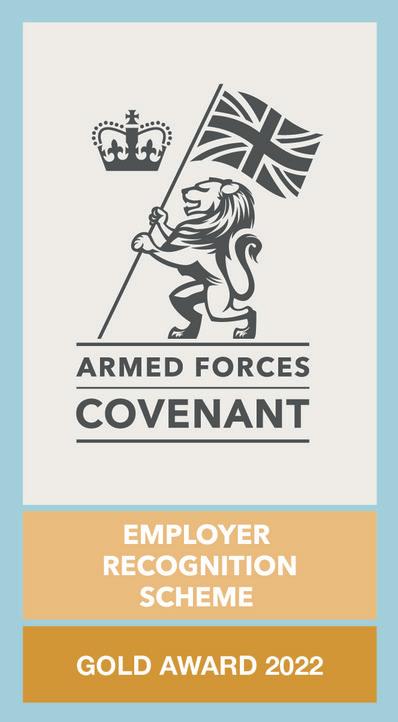
Discover how to care for your mental health by accessing support and building strong relationships during your transition to civilian life
One in six adults in the UK experiences mental health problems like anxiety or depression. For those leaving the Armed Forces, these feelings can intensify due to the pressures of adjusting to civilian life. The challenges of finding employment, managing finances, securing housing, and maintaining relationships can become overwhelming. However, looking a er your mental health and finding support can prevent these issues from becoming allconsuming or provide relief if they already are.
CHALLENGES OF CIVILIAN LIFE
Leaving the Armed Forces o en comes with the expectation of building a new life on “civvy street.” Nicole Hudson, from Combat Stress (www. combatstress.org.uk), says that while most service personnel will make a smooth transition from military to civilian life, a small minority will struggle with the move.
“Some service personnel leave the military happily and embrace civilian life. Others find that the transition can cause them to feel lonely or socially isolated,” explains Nicole. “They may feel they are losing their vocation, identity or status which can cause them to feel isolated.”
She adds that the pressure to succeed in a second career, maintain financial stability, and nurture relationships can take a toll on your mental health. Fortunately, there are many opportunities to talk to someone who understands your situation.
Forcesline, provided by SSAFA, is a free and confidential service designed to help military personnel
and veterans access the support they need, including mental health assistance. Whether through online chat or over the phone, Forcesline acts as a gateway to the comprehensive support SSAFA offers. This service is independent of the military and all correspondence is kept confidential. You can get in touch over the phone or through the web chat feature. To learn more about the service, visit the SSAFA website at www.ssafa.org.uk or call 0800 260 6767.
There are also other organisations ready to offer support. Help for Heroes (www.helpforheroes.org.uk) offers a range of mental health workshops and access to wellbeing coordinators who can guide you through difficult times. If you’ve been injured or disabled during service, Walking With The Wounded (walkingwiththewounded.org.uk) can help you find new career opportunities and offers support for mental health challenges.
Post-traumatic stress disorder (PTSD) is o en associated with military service, but only a small percentage of those who have been deployed or served in combat are diagnosed with the condition: “But the rate of PTSD among UK veterans still stands at 7.4%, compared to 4% among the public,” reveals Nicole. “Traumatic experiences can leave veterans facing serious mental health challenges for years, o en decades, a er serving.”
PTSD symptoms vary but commonly include flashbacks, intrusive thoughts, nightmares, and physical sensations like pain, sweating, or trembling. These symptoms can appear shortly a er a traumatic event or may not emerge
until months or even years later. “Without help, conditions like post-traumatic stress disorder destroy lives and tear families apart,” continues Nicole. “By giving former service personnel the tools to manage their mental health we can help them on their journey to recovery.”
Treatment for PTSD can involve a variety of approaches, from talking therapies to innovative methods like virtual reality and exposure therapy. The key is to get support as early as possible.
Healthy relationships play an important role in supporting your mental health, both during your transition to civilian life and in the years that follow: “As humans we are fundamentally social beings. Having plans to spend time with friends and family during the transition can make it easier,” adds Nicole.
If you don’t have a strong support system, it’s important to remember that there are ways to meet new people and build connections. Joining a local community group, a new workplace, a support group, or a veterans’ breakfast club are all excellent ways to expand your social network. Establishing these connections can provide the support and companionship you need as you adjust to civilian life.
“Healthy relationships play an important role in supporting your mental health”
Many service leavers experience feelings of loneliness and isolation a er leaving the Armed Forces. A survey by The Royal British Legion found that almost 70 per cent of the Armed Forces community agree that loneliness and social isolation are significant issues, with one in four survey respondents indicating that they o en feel lonely or socially isolated.
Nicole says these feelings are completely normal, especially considering the huge change from the structured, communal life of the military to the more solitary environment of civilian life: “It’s a major life change. Veterans may
feel a shi in their sense of self, and a loss or bereavement for their military career,” shares Nicole.
“Many will experience feelings of distress, loneliness and sadness. This can be managed with good support from loved ones or by approaching your GP to access professional psychological help.”
Without the correct support, feelings of loneliness and isolation can lead to other mental health problems. Prevention and support are important to ensure this doesn’t happen. Armed Forces social support groups offer an opportunity to meet like-minded people who understand how you’re feeling. These groups can be found through resources like Veterans’
Gateway (support.veteransgateway. org.uk), where you can connect with others who share your background and experiences.


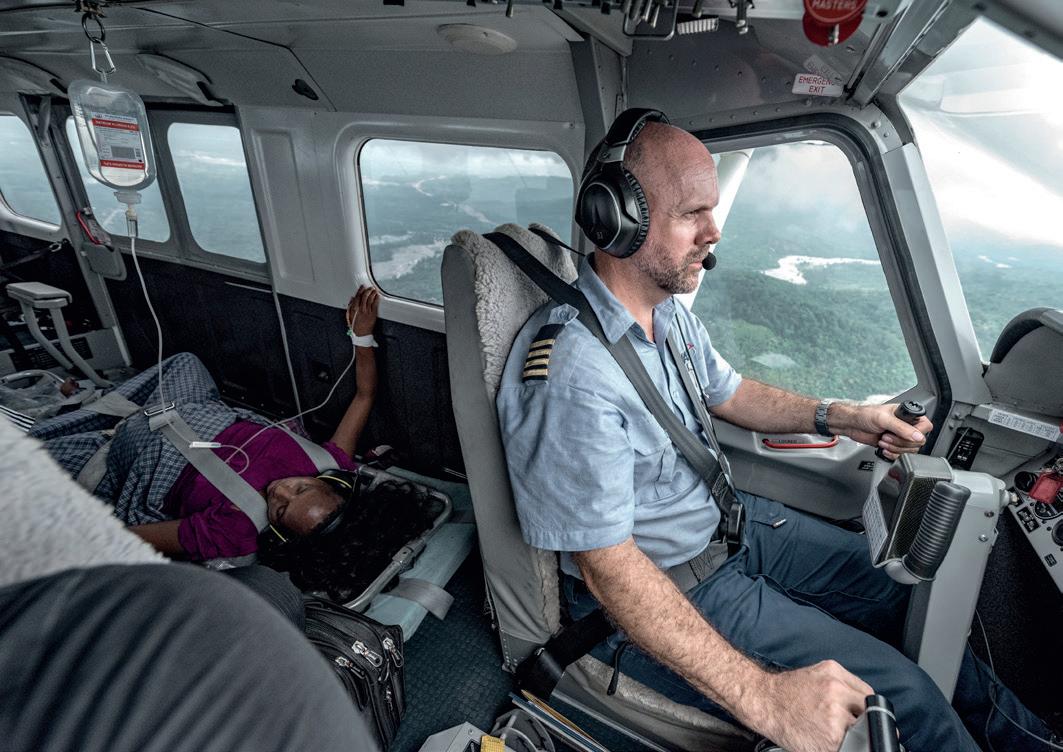
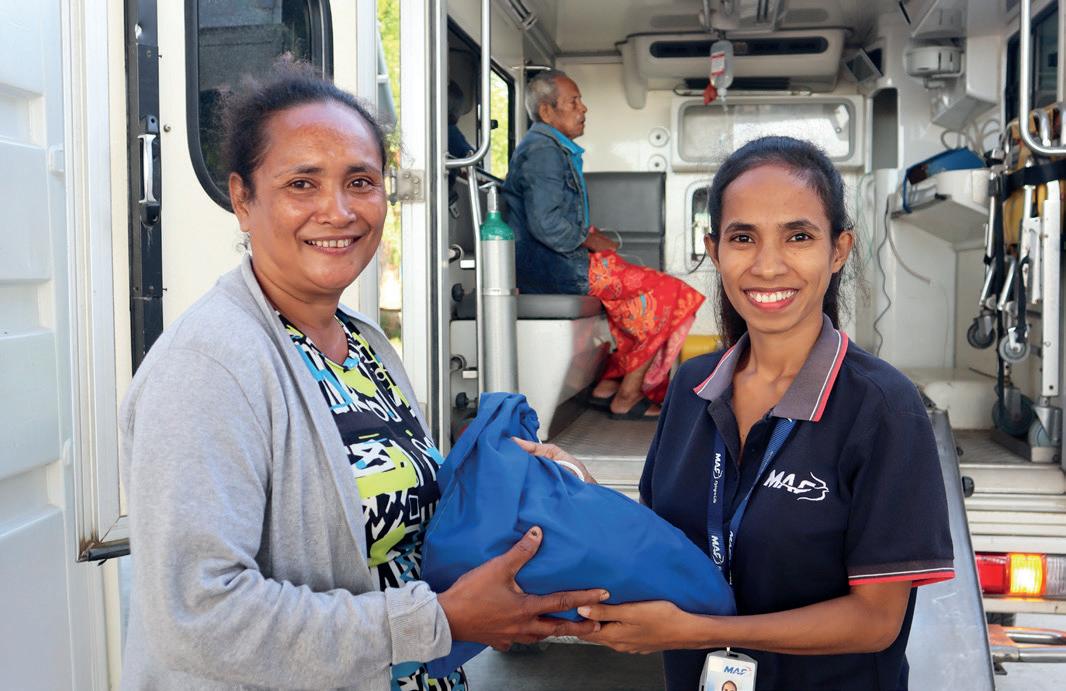
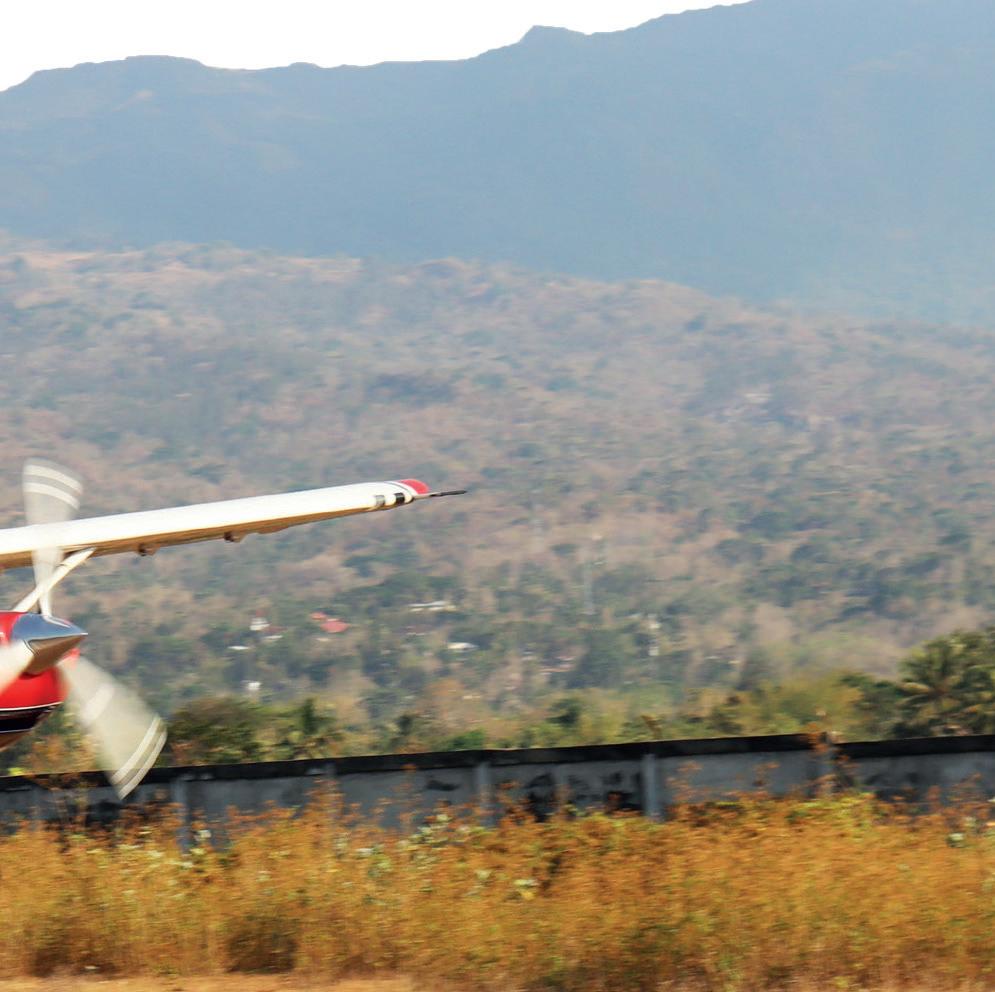
Every year, MAF Timor-Leste carries out hundreds of life-saving medical evacuation flights. MAF is the only air ambulance, and there’s only one hospital in the whole Southeast Asian nation.
Many patients have never flown or even left their village before. They are scared, far from home and don’t have any personal belongings with them. MAF saw this challenge and started the care pack project.
For just £17.29, you could provide a simple gift of a bag of essential items to help a survivor during their recovery. You can restore hope and provide comfort in their greatest time of need.



Leaving the forces with an injury can make the move back to civilian life more difficult. But no matter what your journey looks like, support is available to help you succeed
Transitioning from military to civilian life can be challenging, and everyone has their own concerns during this change. For those who have acquired a disability, these challenges may feel even greater, but there is support available to help you find your path on civvy street.
Simon Brown was serving as a corporal in Iraq when he was shot in the face by a sniper. He woke up seventeen days later and learnt he had lost all the sight in his left eye and had 20% vision remaining in his right.
At first, he was devastated,
having lost his vision, job and the future he had imagined. He was back to square one, having to reconsider his original plans for his civilian life.
“I knew my career was over because of the severity of my injuries, so I was very much aware that I needed to look at transitioning,” explains Simon. “It was a blow because it felt like all the qualifications I had were now useless, and everything I’d done wasn’t really transferable because of my vision loss.”
Naturally, Simon was concerned about how he could rejoin the job market with a visual impairment, but he soon discovered that there was support and dedicated services
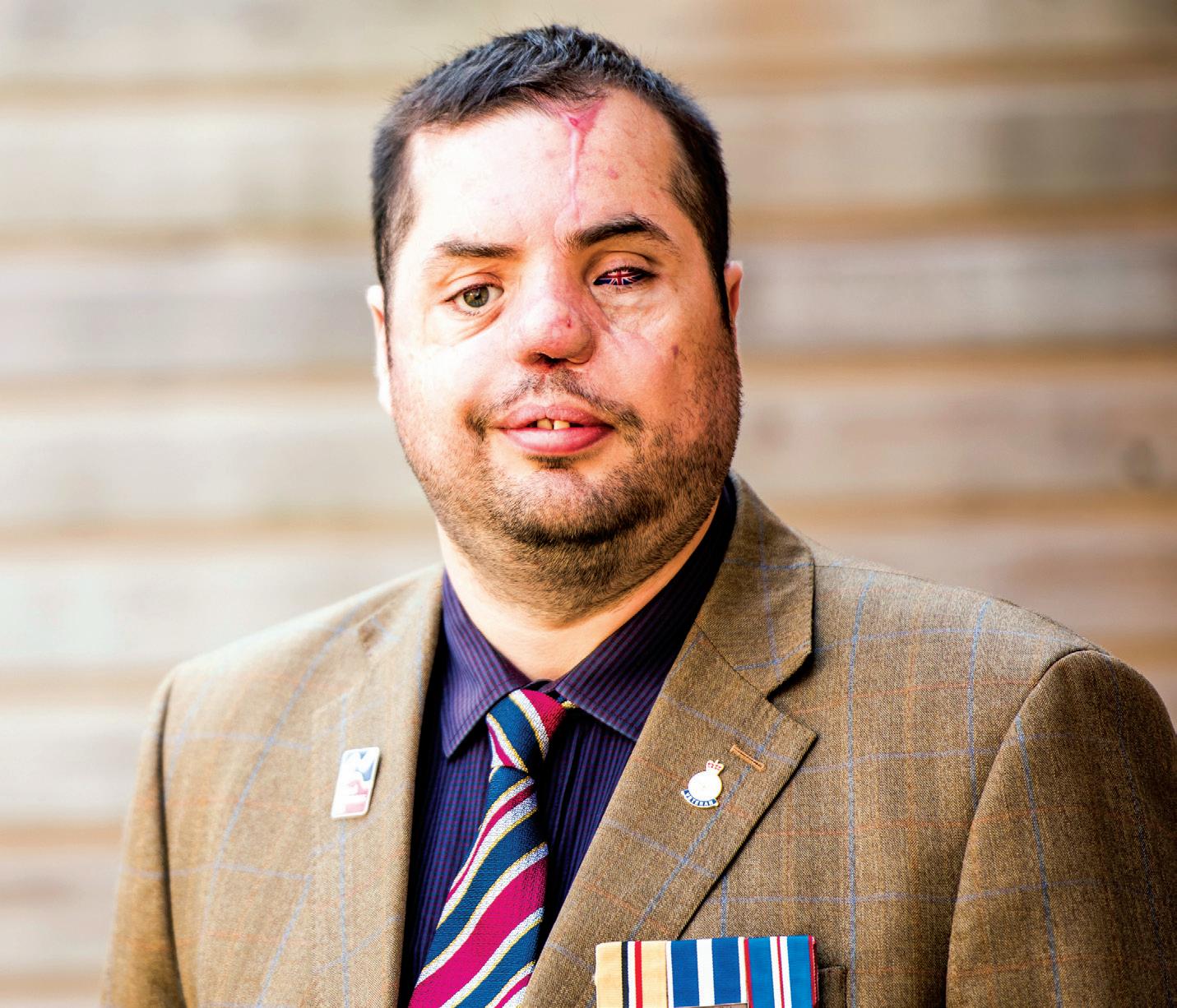
Simon Brown
ready to help.
Blind Veterans UK support veterans who have vision loss with their rehabilitation after they have been discharged. The organisation gave Simon the training and support he needed to move on with his life, and in return, he started to volunteer for the charity. Eventually, he was hired as a communications officer: “I got to know the staff really well. They knew my strengths and weaknesses because I’d used my time wisely and built a reputation. When the job opportunity came up, the staff knew it was a role I would be capable of.”
Finding a job after medical discharge can be tricky, but it’s not impossible. Under the Equality Act 2010, employers must make reasonable adjustments to ensure that workers with disabilities are not substantially disadvantaged when doing their jobs. This includes changing the recruitment process so you can be considered for a role.
“I needed an employer that was empathetic to the fact I was still going through lots of surgery, so would need time off,” reveals Simon. “I also wanted meaningful employment. I didn’t want to just be the token; I wanted to add value.”
Working with Blind Veterans UK has given Simon a new lease of life. He believes that finding a new purpose after the army was pivotal to his recovery: “When I get up in the morning, I look forward to what I do. When I have my dark days, I’ve got a reason to get through it. That’s quite a powerful tool.”
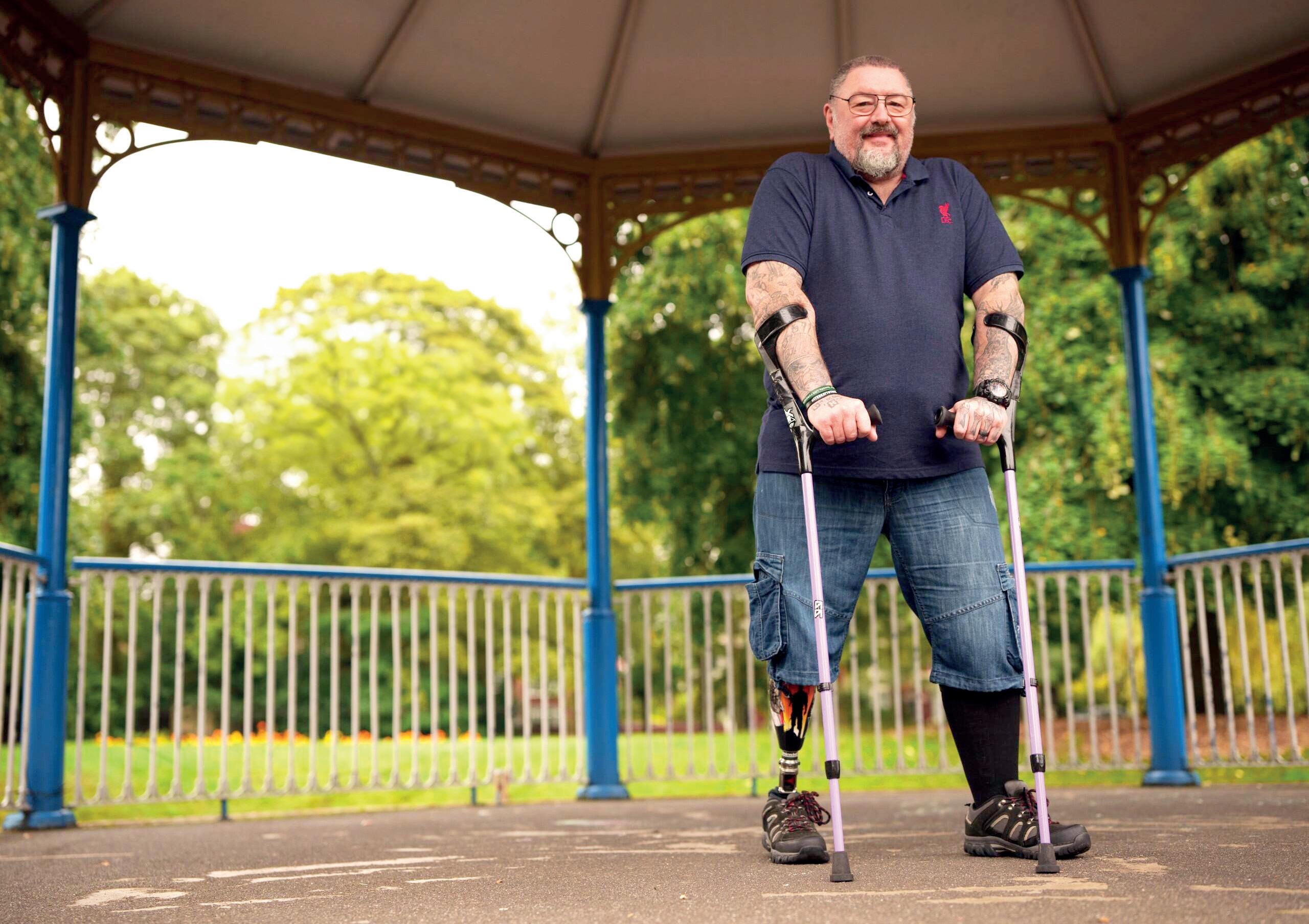
Bryn left the army in 2005 after ten years of service. A decade of active duty and the physical demands of military life had taken its toll on his body. Although Bryn loved his time as Infantryman, it had reached the time for him to transition back to civvy street.
He quickly found his place in civilian life and used his military expertise to launch a successful career in private security. But in 2006, while on a job in Iraq, the car Bryn was in detonated an IED.
“I was working as a private military contractor when a roadside bomb injured me,” discloses Bryn. “I lost part of my right leg, and my other leg was badly broken. I also lost part of my bowel and my intestines.”
His former company paid for Bryn’s surgeries and the cost of his new prosthetics. He wrongly assumed that because he was injured after service, he couldn’t access support: “I had no support from the MOD or military charities to start. I didn’t think I was entitled to it because I was injured after I had left the forces, so I never asked for it.”
The years that followed were undeniably difficult; Bryn struggled with his mental health and the loss of his previous life. He turned to alcohol to mask his pain before eventually accessing help from the Military Veterans’ Service NHS Pennine Care.
While in counselling, Bryn encountered Walking With The Wounded (WWTW), a charity that supports injured soldiers after their military service. He connected with David, an Employment Advisor, who talked to him about his career options.
“It was difficult to adjust to civilian life after losing my leg and to being disabled more than anything,” admits Bryn. “But once I had the help of WWTW, I found out there were still lots of things I could do. They told me about the different courses I could access and helped me get funding for them.”
Bryn has since decided to retrain as a counsellor and has gained qualifications in Dementia
Awareness and Mental Health First Aid. With the help of WWTW, he has secured funding for further courses and is excited about his future.
“I was inspired by the care I had received from the service. I realised I wanted to help others as I had been helped,” explains Bryn.
With WWTW’s support, Bryn has turned his life around. The organisation supported him every step of the way, and he cannot praise David enough. It took him 15 years to reach out for help, but he finally feels like a valued member of his community once again.
“If you’re struggling, don’t be too proud to ask for help. Take any and all offers of help, and if none is offered, go out looking for it,” stresses Bryn. “Do as much research as possible because there will be something out there.”


A
Royal Navy veteran from Warfield is embarking on a nationwide journey in a 22-year-old car to raise funds and awareness for PTSD
Neil Sait joined the Navy at the age of sixteen and dedicated nearly a decade of his life to serving his country. During his service, he witnessed the horrors of multiple conflicts, which le a lasting impact on him. “I wiped a lot of it from my memory,” Neil says. “It wasn’t until ten years ago that I realised I had Post Traumatic Stress Disorder (PTSD).”
When Neil received his diagnosis, he was going through a challenging period in his life. He had recently divorced and was sofa-surfing: “I was one step away from being homeless.”
While Neil was staying with his sister, she noticed some worrying behaviour and suggested he visit his GP to discuss how he was feeling. “I wasn’t me anymore,” reveals Neil. “I was experiencing flashbacks and questioning everything.”
Eventually, Neil was introduced to the Hidden Wounds team at Help for Heroes who helped him turn his life around: “Without that support, I wouldn’t be where I am today. They helped me understand my illness
and manage it on a daily basis.”
He encourages struggling veterans to reach out to the team if they’re experiencing similar feelings of distress. “Veterans displayed their courage in many ways during service,” he explains. “But perhaps the bravest thing they can do now is open up and come forward for support. It frightened the hell out of me, but I’m so glad I did it.”
It hasn’t been an easy ride, but he learnt a lot about himself during his recovery. “I share more about how I struggle with the people around me now,” he explains. Simple actions, like choosing a seat with his back to the wall when out for dinner, help him cope. “All sorts of weird things,” he chuckles, but sharing his feelings has been therapeutic and enlightening.
These days, Neil enjoys keeping busy. Previously, he has taken part in three Veterans Honour Rally’s across Europe and the UK, completing all of them in a £500 VW Golf Cabriolet that he painted to resemble a Shetty lifeboat.
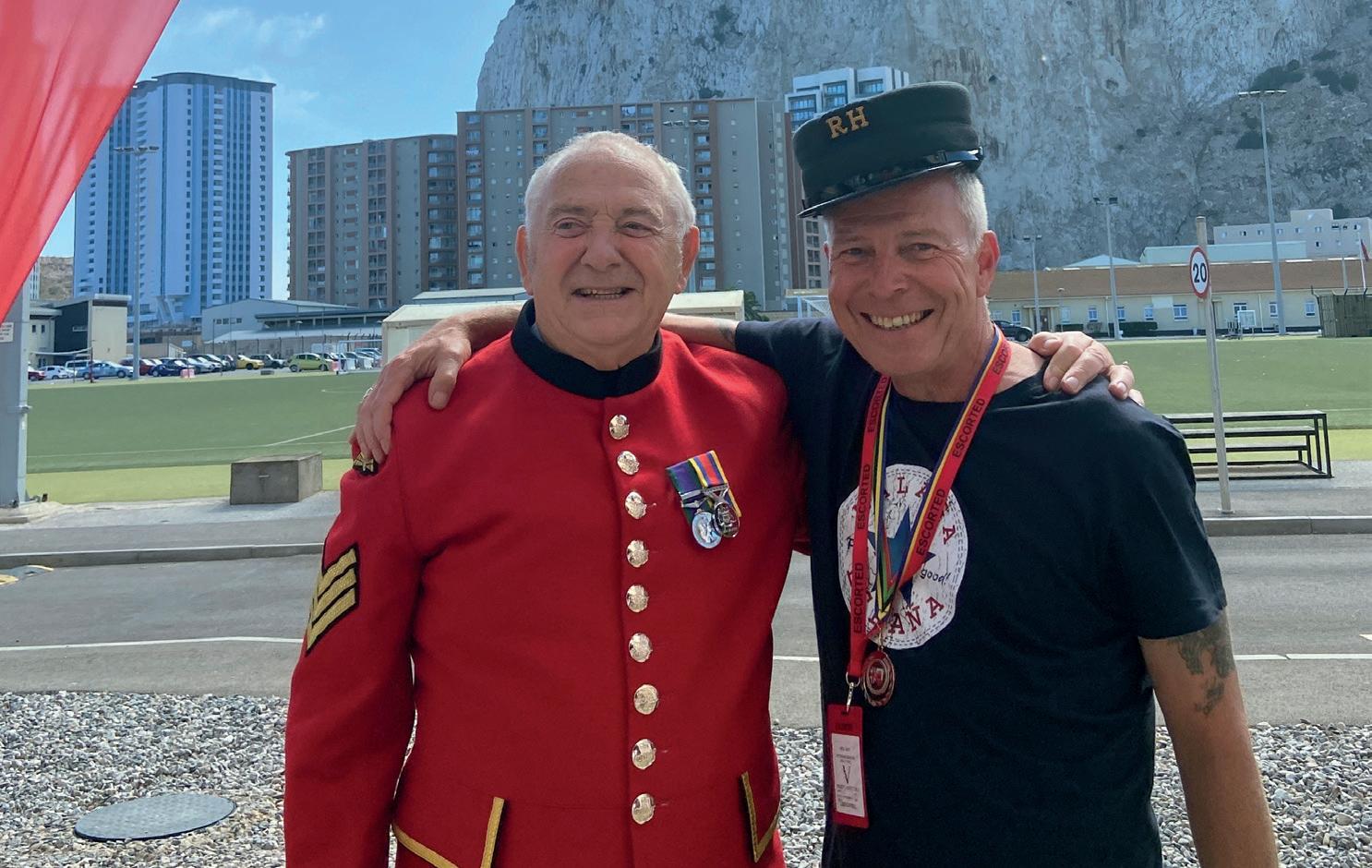


This year will be his fourth, and he’s taking his 22-year-old “banger” car around the UK in honour of Help for Heroes. “I can’t wait to get back on the road. Every year, I say it’s my last one, but it never is,” laughs Neil. “It’s an absolute blast from start to finish. I’ve had the pleasure of taking a Chelsea pensioner across the Pyrenees. He told me all sorts of stories about his past; it was fantastic.”
The journey is packed with all the antics and camaraderie you would expect from 20 teams of veterans. From challenges to pranks, there’s never a dull moment during the five-day adventure, and plenty of refreshments are waiting at the finish line. However, it’s not just the thrill of the trip that keeps Neil coming back; it’s the chance to connect with others who understand his past.
“The trips bring together veterans from all branches of the military and across generations,” he explains. “Just getting together like that. It takes your breath away.”
Get support from Help for Heroes: helpforheroes.org.uk
Sign up for the next rally: www.facebook.com/groups/ veteranshonourrally





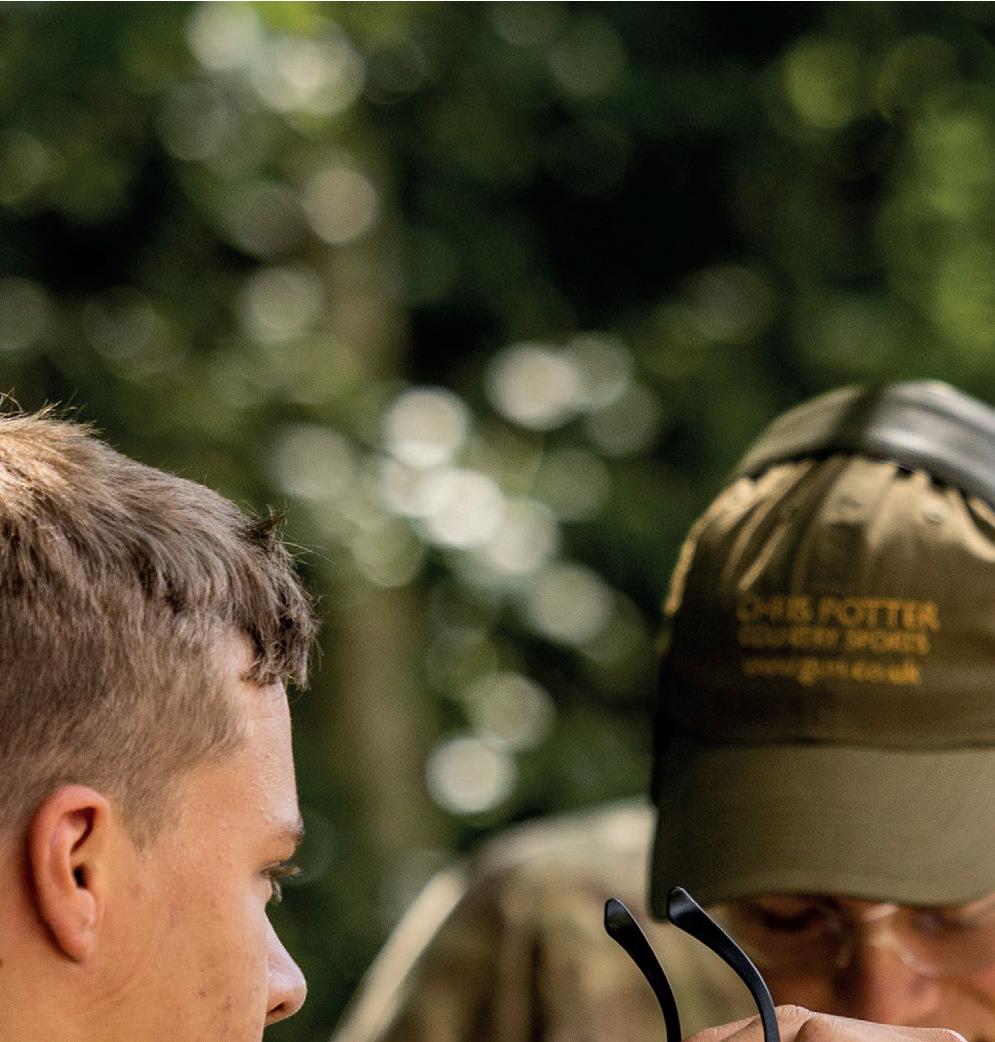
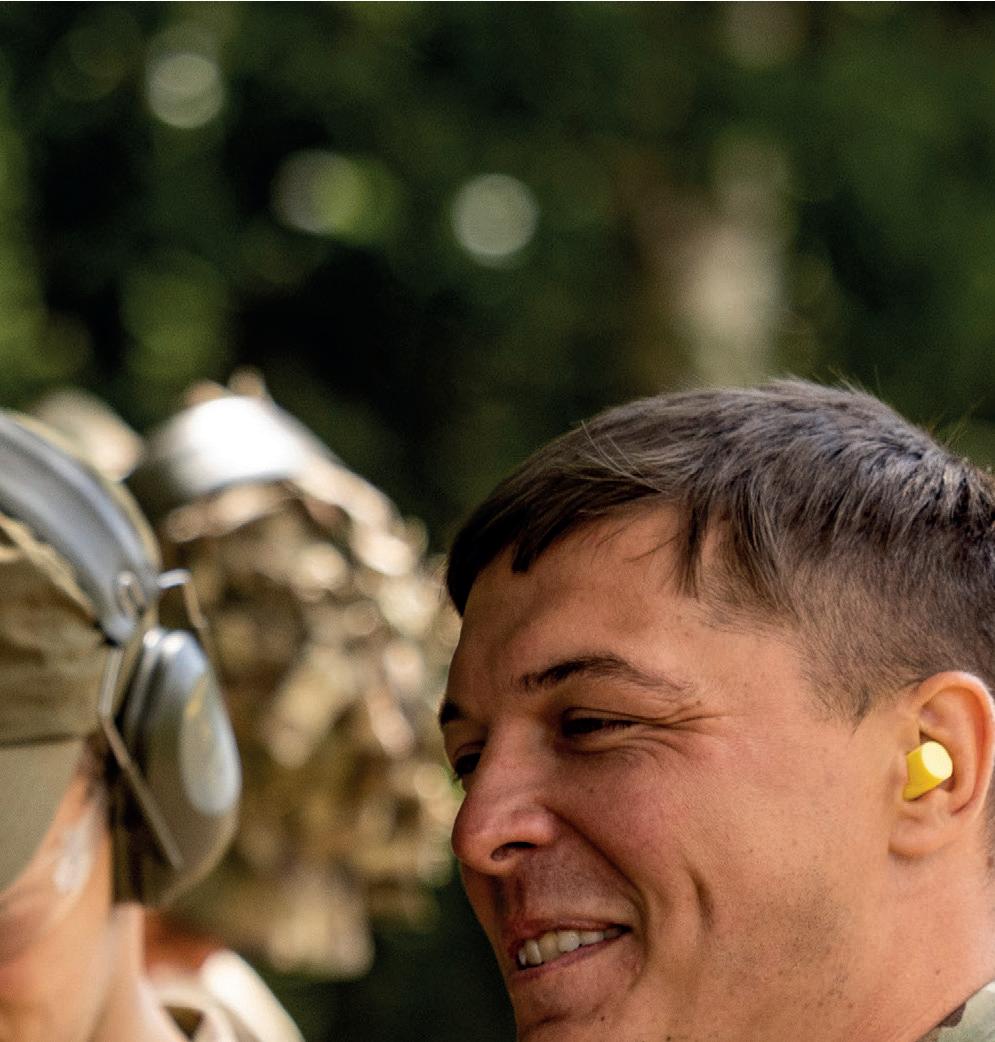
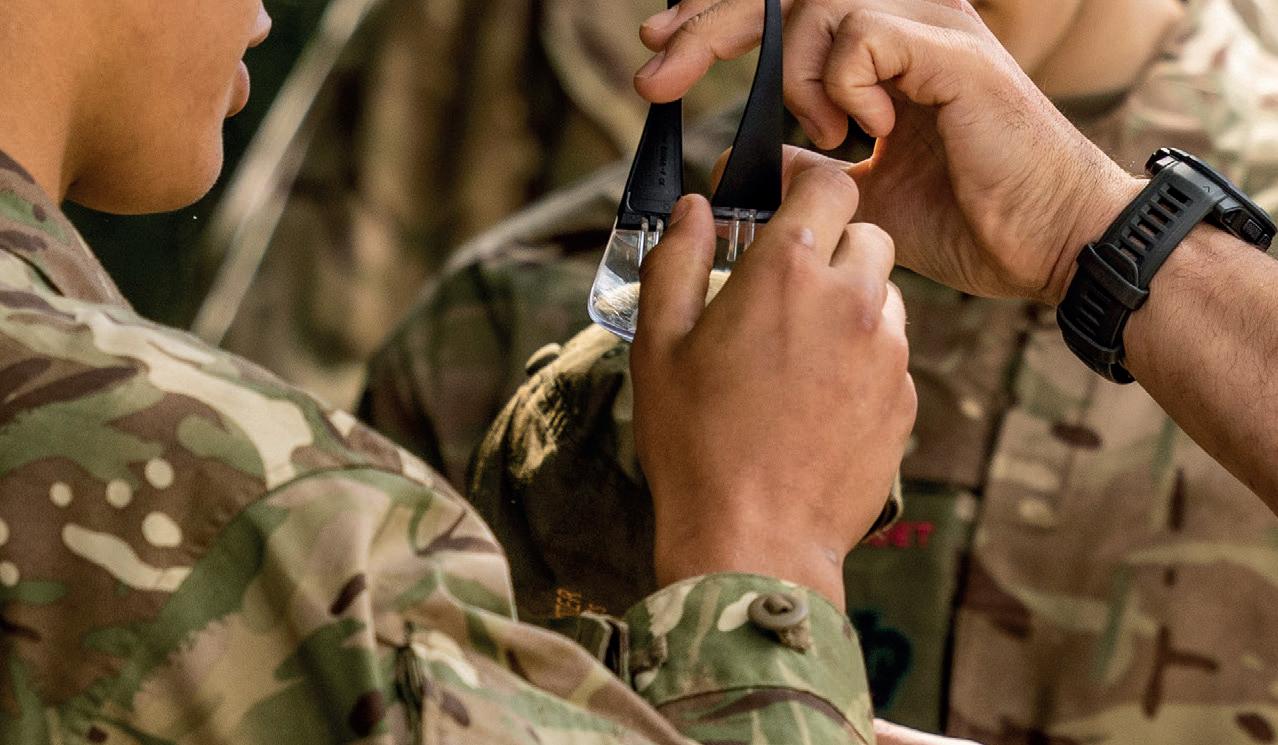



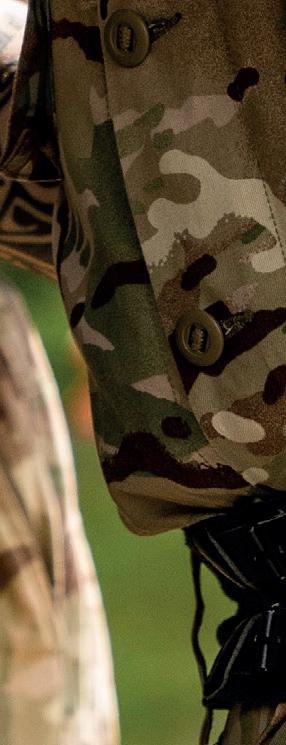


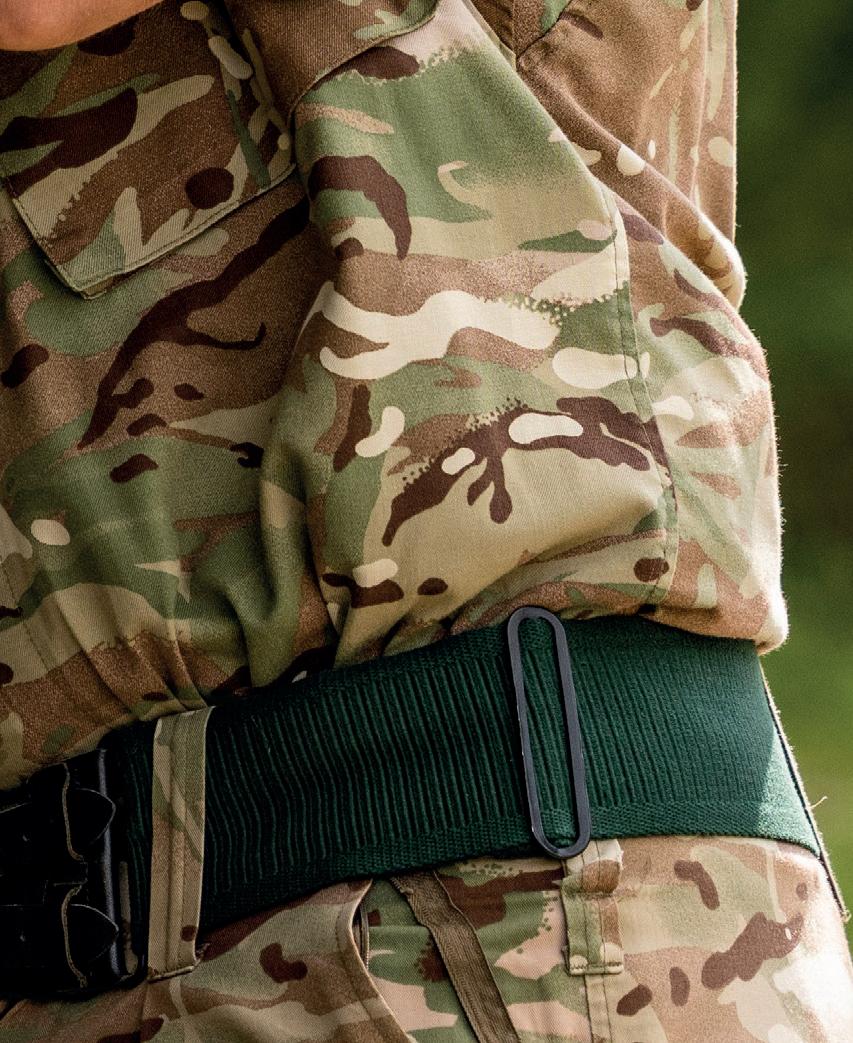

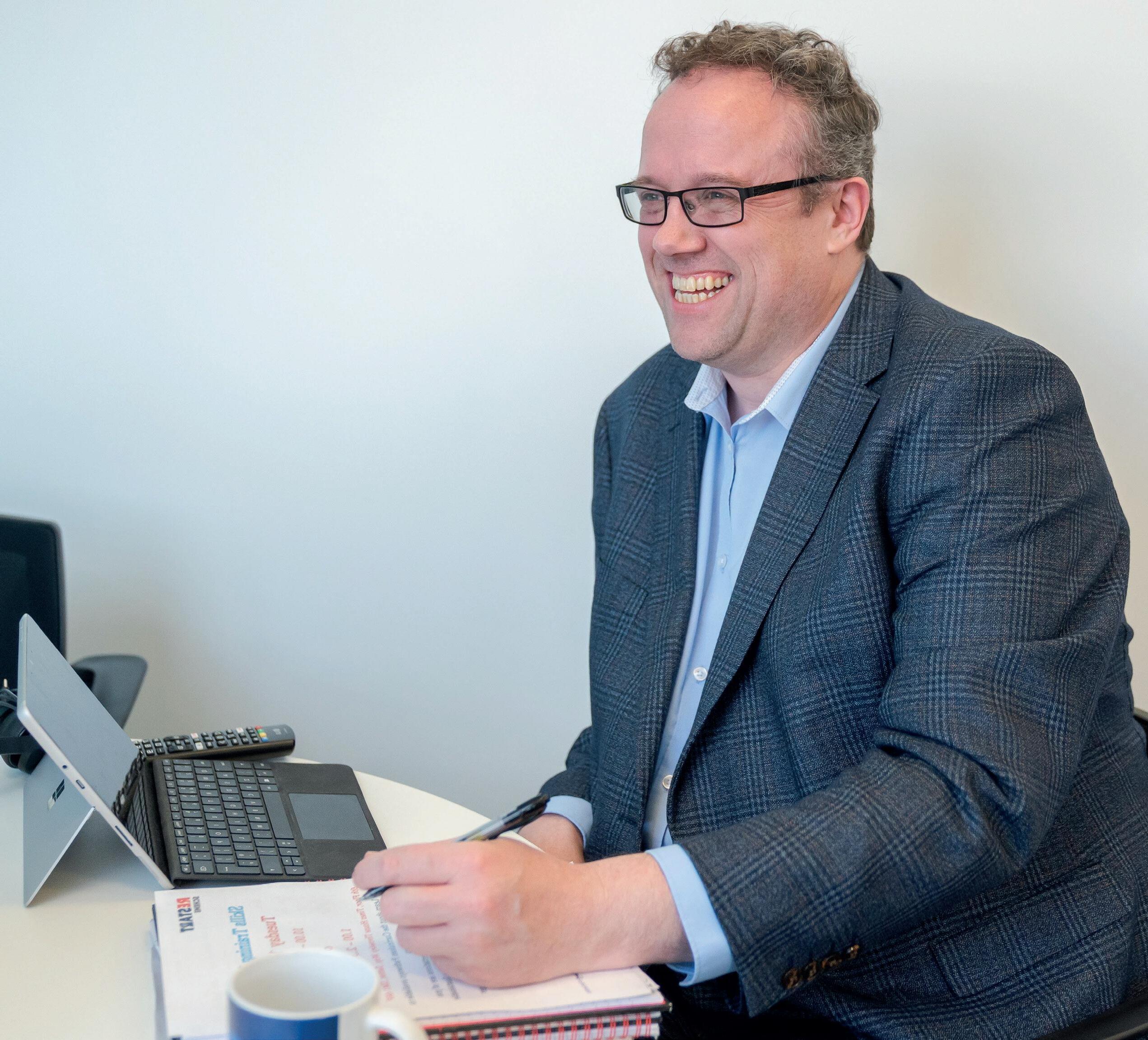
Clear aims, expert advice & the right resources.



The new CTP will guide your successful resettlement from October 2024
